#he is one of THE most terrifying villains in fiction and I will die on this hill
Photo

SO. This piece of work.
I honestly thought Halbrand being Sauron would have been so on the nose, but somehow, they managed to make it absolutely fucking terrifying.
Think about it. He was pulling every single thread from the very beginning, with deadly purpose and terrifying precision. He knew exactly was he was doing at every step, the whole time.
Yes, even if he was feeling repentant at any point, as published canon tells us he was -- I’ll be damned if he didn’t always have the option to completely drop the repentant ordinary life in Númenor the minute he ran into something that forced his hand, like Galadriel did, in the back of his mind. Or, even if she hadn’t -- the minute he got bored of playing ordinary smith.
And he would have. Yes, yes, he would -- he has a mind like a subtle knife. The very second he got bored...
He let Galadriel learn the truth about him. He had no reason to keep playing peaceful king -- he’d seen Celebrimbor at work, seen the elves’ panic first hand, seen Mordor take shape, seen all the key pieces having been moved into the right places.
He could have spun an actual, spoken lie, this time: that the line of the kings hadn’t been broken, that he was the very last survivor of a bloodline that had hidden itself for centuries. It would have been as easy to him as breathing.
But where’s the fun in that?
Where’s the conquest?
Why reign over an insignificant little mortal kingdom when you can have all of Middle-earth gripped in an iron fist?
Who wants mere subjects when you can have worshippers?
Fuck repentance. Let the true king finally take what’s his. Tell Galadriel the truth.
Again.
That’s all he ever did. Not one lie, not once.
He is so horrifically good at what he does that he doesn’t even need to lie to deceive people.
He’s Sauron the Deceiver, after all.
#The Rings of Power#Rings of Power#Sauron#Halbrand#he is one of THE most terrifying villains in fiction and I will die on this hill#ROP just rammed that fact home again#when I said this show wielded emotion like a blade I meant it#ALL emotion#joy sadness amusement anger despair love#and now FEAR#I hate him to no end#and that is GOOD because I am SUPPOSED TO#I don't know if I would have hated him half as much if they'd gone by any other route to introduce him#brilliantly played writers#(and massive kudos to the wonder that is Charlie Vickers too)
1K notes
·
View notes
Text
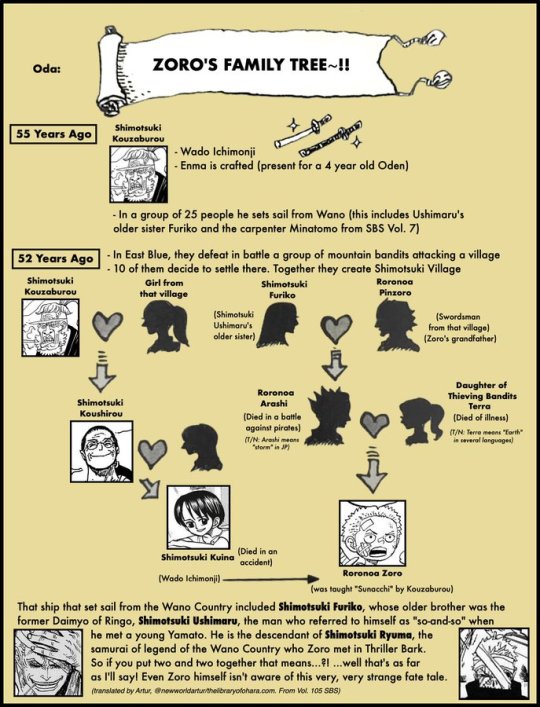
So, I just know all of Tumblr was wondering, "hey, you remember that really weird ZoLaw fan with the annoyingly overly stylized post? I wonder if she's seen this and if she has any theories or thoughts, an observation or two?"
Well, allow me to set your wandering mind at ease, fictional Tumblr fan. The answer is: No. No, I really don't.
I have like three hundred.
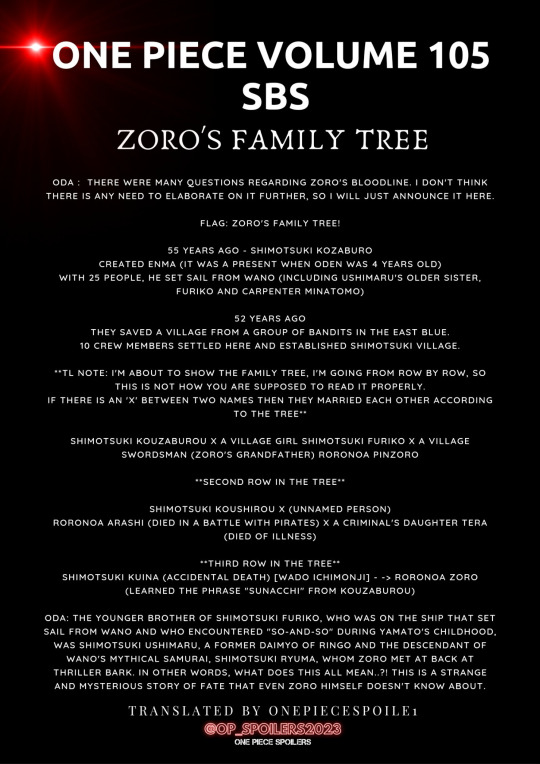
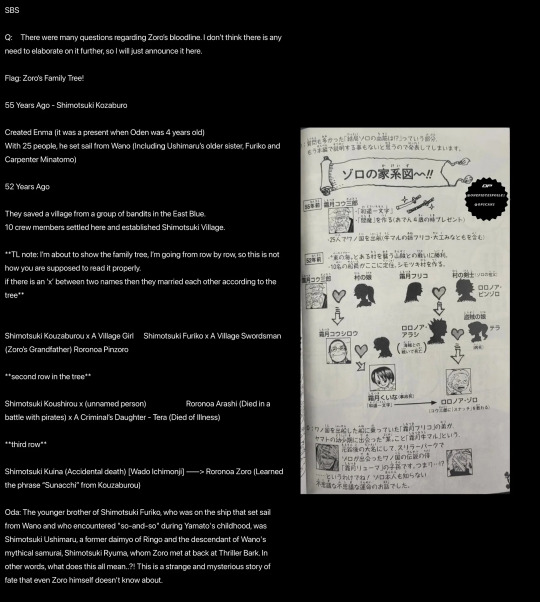
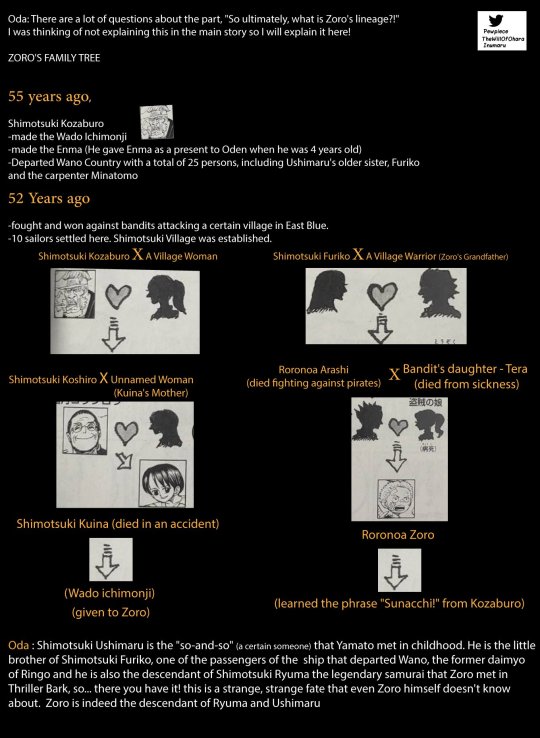
[I also spent time just trying to track down as many translations as possible. Is Tera A Criminal's Daughter or The Daughter Of Thieving Bandits! These are CLEARLY separate things and can ENTIRELY change how her utter nonpresence in Zoro's life shaped him! Though I can take comfort in knowing that, regardless of what kind of crimes her father was committing they were more important than anything his daughter ever did in her entire life.]
And, hey, as might as well jump right into that whole mess.
1. Wait, Zoro's mom is dead? Thank goodness, I was worried Oda forgot one!
(AKA: Stop. Murdering. Moms.)
I'll go first, I don't mind saying when I was wrong. True, in the past I may have suggested that the vast majority of female characters in One Piece come off as ever so slightly, "leaning into sexist tropes with unadulterated joy; it's the misogynistic tropes equivalent of a child running naked through a grocery store. It's right there, everyone sees it, yet people shut up and continue shopping in part because, well, these days you just expect most people to cover that junk! What would you even say? And if you DO speak up and call out the inappropriate, be prepared for blank stares and tantrums; but THEY don't mind! THEY don't think it's wrong! You're just being mean!"
More or less a direct quote.
However, I see now that I rushed to judgement and the reality of the situation is far more nuanced. With that in mind, I was just wondering if someone could help answer some of the questions I have.
Like: Why does Oda believe that it's illegal for (maternal) female characters to survive other character's backstories?
More importantly, why hasn't someone just reached out to explain the misconception!? It can't be that difficult. If nothing else, just have a lawyer or judge or other expert in censorship on hand. Or is the one of those cases where back in highschool his friends made something up and then kept pretending it was real to see if he'd believe you and not only did he fall for it, it took over 20 years before he learned that, what, no that's not illegal. That would be crazy if it were an actual law. Cause you know, after the first 10 years I think yeah you have to just lean into it. Pretend it's a creative decision on your part and definitely not because you were terrified of being sentenced to a slow and humiliating public death.
Just to be clear that's definitely what's up, right? I mean, I'm struggling to think of another reason....able excuse why a story that I really enjoy keeps playing the same old sexist tropes cards again and again to the point of absurdity. It would just help if I had a valid excus- explanation. I almost mistyped the word explanation.
....
....
So I imagine it went like.
"That's the third mangaka they've had to Publically Execute this week!"
"They've started taking this law way more serious lately."
"This one really deserved it though! I heard his main character has a mother in her late forties!"
"That does seem old to have your first child."
"No, he's the middle of three and 22 years old. The story even has flashbacks of defining moments in his childhood and never once did she try to sacrifice herself for him, get murdered by his enemies, or die in meaningless unrelated accidents."
"Damn, that's cold to be there for all the protagonist core moments and not die and help him develop and grow a character? They must have a very antagonistic relationship. Is she actually the villain."
"Not that we know, and when they asked about this being a possible plot twist since - obviously if she's evil no laws are being broken."
"Well, of course, that's the whole reason Statue 2-dash-57 exists; if creators can show they have consistently been building up to a surprise twist then the female character in question can continue to live so long as she continues to be unrepentant and unlikable until the resolution of her arch by the protagonist."
"That's the thing! Under oath not only did man present no evidence to support her identity as a secret villain, he went on the record stating he wanted to depict their relationship as one of a normal modern 20 year old and his mother."
"That can't be true! What publishing company would even print that!?"
"It gets worse. I told you he was a middle child? Well, according to those who've read the actual manga, his younger sister was really sick as a child."
"Oh, well, at least-"
"It was just a fish allergy. She's perfectly fine."
"Sometimes I feel this law is unnecessarily harsh but.... Then you hear stories like that, and you realize that some people really are monsters."
#So this was going to be one post three parts (because obviously) then I remembered even people who have purposefully followed me hate that#I took into consideration that not everyone wants a unmountable wall of Zoro meta analysis on their dash so now its gonna be 3 post style#keeping in mind I've already written it all up and will just be posting them one after the other so effectively the same result#only with the illusion of my empathetic nature#I do have a lot of thoughts on what amounts to a very small amount of scribbled lines and a couple doodles#he literally didn't even bother giving Kuina's mom or grandmothers a name like they didn't even have a identity#In fairness there wasn't a need for them to have any kind of identities or individuality or identifiable features#everyone knows only one trait really matters when it comes to adult females: they go down#into the ground....as a corpse. After ensuring that their death would be the best way to help their children grow. As characters.#I'm joking cuz its funny. It's obvious why Zoro's mom got a name & description: she gave birth to a protagonist and not a human sacrifice#But have considered why those specific qualities are what he chose to define her by - she's fictional he could have made up anything!#I'll have to talk about it in the other posts I'm wasting precious tag room#one piece#roronoa zoro#one piece meta#one piece sexism#this post is not for everyone; actually its pretty much just for me#conversations with fictional people#more opinions than anyone asked for about subjects they don't even care about#Oh! I found the blogs new subtitle!#author gets sassy then preachy then sassy again and then swerves sharply to the weird#oh these tags are way too much#Zoro's backstory#Zoro family history#amusing musings#why am i the way that i am#three post style: part one!
50 notes
·
View notes
Text
Book Review: “A Lady for a Duke” by Alexis Hall.
‘I see you.’ These are the words, unspoken verbatim but always felt, that run through Alexis Hall’s regency romance novel A Lady for a Duke. These are the words that, in my opinion, inform every great love story, both in fiction and in real life. That idea of someone looking at you and just KNOWING you, knowing all that you were, all that you are, and all that you could be- that’s at the heart of romance. Looking at someone’s truth and not blinking; looking at someone’s truth and accepting them as they are; that’s love.
Now, I love regency romance. And, obviously, I love love stories with trans protagonists. And while the traditional publishing industry doesn’t generally have a ton to offer on that front, one notable exception to the rule is this book. It tells the story of a noble born English trans woman who is gravely injured and presumed dead at the Battle of Waterloo, and, after convalescing in France with a lovely trans man and his wife who helpfully explain a few things, uses the opportunity to become who she has always been: Viola Carrol. Now, obviously, trans issues were not understood in the 1800s, and the English class system was gender-segregated to a truly terrifying degree, so upon returning to England and reuniting with her clueless but ultimately accepting and affirming family, Viola contents herself with a life of spinsterhood, helping raise her nephew and convincing herself she’s content with being alone.
All this changes, however, when a trip to an old friend’s manor results in a reunion between Viola and her childhood best friend Justin, a wealthy and deeply traumatized Duke suffering from festering war injuries, both physical and psychological. And at first, he doesn’t recognize her. She looks different, acts different, moves different, smells different, and besides, Justin’s friend died at Waterloo. And while Viola doesn’t contradict him at first, as Justin’s senses slowly return and the two begin spending an awful lot of time together, forging a new kind of friendship in their own right… He begins to see her. And she begins to see him.
Put simply: he’s a brooding mess with a drug problem, hiding in a castle waiting to die; and she’s a bundle of nerves drained of her former daring confidence, too afraid to let herself be happy. But within each other they see the potential for more: a dashing gentleman who will always do the right thing and needs to learn to give up control is what Viola sees in Justin, and a beautiful and fearless woman willing to sacrifice everything to live the life she’s been denied is what Justin sees in Viola. Before Justin know who she truly is, they develop a lovely flirting dynamic, and afterwards, once the shock wears off and the two actually start talking like grown-ups, you really do see two best friends coming to understand each other in new ways, even if they’re afraid of what it means. Even if they’re both convinced that they can’t be what they want to be.
Because SOCIETY.
Yes, that’s right, the real villain of this piece is not transphobia (well, mostly), but the British class system, which requires Justin to have a noble wife to ensure the security of his line. Or at least that’s the excuse Viola hides behind for most of the book, anyway. Because she’s afraid of being seen. Afraid of being rejected. Afraid that if anyone gets too close and ferrets out who and what she is, she’ll be condemned or even killed.
But this isn’t that kind of story. This is a love story about two damaged people learning about themselves and growing together. And learn and grow they do, coming together in a collection of moments that frequently left tears in my eyes. Hall’s writing handles both Viola’s gender dysphoria and Justin’s PTSD adeptly, through the blurry haze of dissociation and depression, and seeing our leads work through it and come together and get to finally, mercifully be happy together was absolutely beautiful.
The third-person narration of the novel mixes description with thought beautifully and artfully, making you see the emotion behind each word, conveying how it colors the characters’ perceptions of their surroundings and the unfolding plot. On top of that, clever, sparkling dialogue that manages to be witty in a (mostly) period accurate manner helps convey the chemistry between the two leads, as well as just being genuinely funny at points. Hall also weaves the story of these two lovestruck idiots into a broader commentary on the roles of men and women in English high society at the time, with the dark underbelly of that class system leading to several genuinely shocking twists and turns. Add into all this a very swoon-worthy bit of Regency-era bodice-ripping, some supremely cute moments of romantic squee between the leads, and a fantastic ending that conveys how far the characters have come in a manner that left a big, stupid smile on my face, and you’ve got yourself a truly great Regency romance.
It’s a fairy tale, in a lot of ways. Something like this probably never happened in real life. It probably couldn’t have happened in real life. But I don’t need it to be totally realistic. Especially in this subgenre, sometimes all I want is some wish fulfillment. The simple idea that someone like me could have gotten this kind of sweeping love story, gotten to be happy on her own terms with the man she loves, is more than enough. The idea that someone like me, someone like Viola, could truly be seen and accepted back then… Well, it’s hard for a big softie like me not to get caught up in that.
Happy reading, everyone :)
***
Be sure to check out my substack and my patreon for additional content, and consider becoming a paid subscriber if you want to support my work.
I also accept one-time donations via ko-fi:
#alexis hall#a lady for a duke#romance novel blogging#regency romance#regency#England#bodice ripper#book review#girlblogging#trans stuff#trans woman
2 notes
·
View notes
Text
Albedo Piazzolla: Best Villain
If you’re a Nintendo fan, you’ve probably heard of the Xenoblade Chronicles series. Well, a couple of years prior, Monolith Soft released a trilogy of games known as Xenosaga on the PlayStation and later on, remakes were released on the DS only in Japan. This was Tetsuya Takahashi’s second attempt at creating an epic sci-fi story spanning multiple games, anime, and manga. I could go on and on about this game, but then this essay would never end. One of my favorite villains ever hails from this game. Let’s talk about Albedo Piazzolla. Also, there will be spoilers for all of the games, so please stop if you don’t wish to be spoiled. Anyways, I’ll start with the basics.
Albedo has a ton of qualities that make him unique, charming, and terrifying. First of all his design is striking, especially with the sharp shape of his cape and the overall white everywhere. The cape provides him with a unique silhouette. His English voice actor, Crispin Freeman, surely brings this character to light expertly. His theme is brimming with madness, which is fitting for a man as insane as Albedo. Most characters in fiction who are deemed “insane” are simply sadistic sociopaths, but Mr. Piazzolla is truly insane. This is seen in his encounter with MOMO, which I’ll go into more detail in the fourth section. He’s also hilarious at times, especially with “Yo, Rubedo.” It’s such a great line. Even his name is significant. Albedo is one of the steps of the alchemical process and he has relationships with Nigredo and Rubedo, the other two steps of said process. Now, it’s time for his backstory, as it ties to both Rubedo and Nigredo.
Albedo’s and Rubedo’s connected pasts is the main aspect of Episode II. All three of them are Realians, artificially made humans, created by Dmitri Yuriev to combat an entity called U-DO. Because they are unique, they’re bullied by the other Realians. Albedo, protecting his twin brother Rubedo, beats up one of the bullies. Alby doesn’t understand why it’s a problem, considering that he thought that all of them had the ability to regrow limbs. It is here that he realizes that both Rubedo and Nigredo will die before him, and he breaks down into tears while hugging his beloved twin. After a while, the encounter with U-DO arrives. Rubedo receives a vision of the destruction of the universe. This freaks him out and he cuts the link, leaving all of the others to die or to be driven to madness by U-DO. This gives a proper reason for this man’s insanity. While we’ve seen his past and come to know his general traits, let’s look at a few scenes to really illustrate my points in action.
Albedo Piazzolla has some of the best, most memorable scenes in all three games. In Episode I, he kidnaps a young Realian girl named MOMO, and he sits on a pile of her sisters’ corpses, holding one in his arms. He breaks the arm of the deceased girl and tosses her aside like a doll. In the Japanese version, he brandishes a knife, but it was removed in the American version, which honestly improved this scene. He dismembers both his arm and his head, showing his immortal power, all while a choir of haunting voices fills the atmosphere up with utter dread. Another significant scene is when Albedo learns that his healing powers are unique to him. First, he demonstrates his powers to Rubedo and Nigredo by blowing off his head and instantly healing. The two are surprised. Albedo realizes the implications and runs to his brother, hugging him and begging him not to leave him, tears leaking out.
This essay spells out Albedo’s backstory, specific moments, and overall character to showcase this insane mad lad. Usually, I’m not a fan of insane villains, but Albedo is the exception.
7 notes
·
View notes
Note
Hi Mei, so i got a question on previous ask i asked ehich where your favorite characters in fiction but do you have a favorite antogonist/villian? In my case same as before i got a 10 top along with honorable mentions
1. Joker (DC comics)-The clown prince of crime and arch nemesis of Batman. One of the most iconic villains of the DC universe and for good reasons. He killed the second robin aka Jason Todd by beating him with a crowbar after luring him an abandon warehouse. After he qas done he set bombs to make sure the job was done. Paralized Batgirl by shooting her. The fact that Joker doesn't have superpower is crazy considering he killed millions. One of the things i find scary about him is his insanity. He does these thing because he thinks it's funny and that life is a joke. He also doesn't have a definiteve origin story the closest thing we have of his backstory is Batman: The killing joke. Fun fact the injustice universe in a world where superman turned evil was basically the Joker's fault. He tricked superman into killing is wife and unborn child.
2. Green Goblin (Marvel Comics)‐ The amount of thing he has done to make Spider-man life as miserable as possible is insane. Norman Osborn the first Green Goblin was the one who threw Gwen Stacy of the bridge. This cause the death of one of Peter's life interest something that messed him up badly.
3. Lex Luthor (DC comics)- Superman's worse enemy. Funny enough one of the reason why Lex hate superman soo much is because he doesn't want humanity to rely too much on him because he thinks it will make them weak. Intelligent, caculating and ruthless he is dangerous to no end and the fact he is one of the smartest character in the DC universe adds danger.
4. Michael Myers (Halloween franchise)- The big bad and iconic horror character. I find him terrifying for one fact only. He is Pure evil and silent. This was stated a number of times during the halloween franchise. He is silent never once spoken and he kills for no reason.
5. Freddy Krueger (A nightmare on Elm street)- the dream demon of the nightmare on elm street series. He is sadistic, powerful and inevitable in some ways. He hunts his victim on dream and if you die on the dream is game over on real life. The fact that he proyect your worse nightmare and takes pleasure in it makes it worse.
6. Jason Voorhees (The friday 13th franchise)- Another silent killer and Iconic figure in the horror genre. To an ugly bullied kid to a silent vengeful murder. He stalks and ends his victim especially if they set foot on camp cristal lake. Unlike other killers he doesn't kill animals nor children.
7. Light Yagami (Death Note)- For me Light Yagami is somewhat difficult for me on where should i put him. To a once well intention student to an egomaniac with God complex. At first he had good intentions but the more people he wrote on the death note the more he stray from the way. He even beytrayed the people who helped him the most. In the manga his death was pathetic honestly compared to the anime even the shinigami (Japanese Death God) Ryuk said it.
8. Johan Liebert (Monster)- This man is the definition of a monster. A very cunning manipulator who wishes to be the last person on earth. This quote from him that said "The only thing that humans are equal in is death". One of the episodes he nearly made a child unalive himself but showing him the worse in humanity. Luckly the child was save but the protagonist and another character. But the episode was extremely disturbing and he has no value for life unlike the protagonist.
9. Lord Voldermort aka Tom Riddles (Harry Potter franchise)- This man made te wizard world so afraid that people didn't even want to say his name. Evil, smart and powerful antogonist one that shouldn't be underestimated i find him intriguing especially his background.
10. Darth Sidious(Star Wars)- This man his basically responsible for everything to the clone wars to the near extinction of the jedi. Cold,calculating, sadistic and powerful. He is basically one of the reason why Anakin became Darth Vader and Why Yoda's padawan Count Dooku became evil.
Honorable Mentions
Otto Apocalypse( Honkai Impact 3rd)-One of the most unique villains i came across manipulative and culling. Resposible for a lot of the main cast suffering he is one of the most interesting characters i've seen. Despite everything he is very complex, I personally don't think he wanted Kallen to love him back. I think he wanted her to live since he saw that she was the best of humanity.
Darth Vader (Star Wars)- His presence cause a great deal of intimidation. Ruthless, powerful and Merciless. The Fallen Hero has alot of body count during his time as a Sith Lord.
Megatron (Transformers series)- A miner to a founder of the decepticons. He as the mentality peace through tyrany. One of the big bad of transformers he has even manage to killed Optimus back in the old cartoon movies. Althoug his Idw version he was redemed most version of him are evil and cruel.
Shockwave (Transformers)- this decepticon is a scientist with a cold devotion to logic. Even Megatron is cautious of him as he is one the strongest deception in the series.
Madara Uchiha (Naruto)- He as good intention but poor execution. He is basically the smoke demon on naruto. Fought the entire Shinobi allience and went toe to toe with the first hokage. This man has one of the most iconic quotes of all naruto and i love his character.
Pinhead (Hellraiser)- a demon who find pleasure in pain and nothing else. Sadistic and extremely poweful cenobite (basically demon)
I'm way too much of a scaredy cat to watch horror movies, but knowing that Jason doesn't kill animals instantly makes him my favorite serial killer. Like yes, I hate everybody, but animals? They're just following their instinct and trying to survive! Honestly, I would've put Light here if the way the show ended wasn't so... pathetic. Here are the villains I can think of from the top of my head, though.
Spot (Spiderman ATSV) - He appears to be silly and goofy at the start, but I think he's a really good representation of how heroes unknowingly hurt the very people they were trying to save. He lost his job, his life, and even his face because of what Miles did, even though he was just an innocent bystander. I also really felt it when he said this: "You make your flippy, little sassy jokes, and everyone loves them, but no one knows what it feels like... to be on the other side of them."
HoT Raiden Mei (HI3) - Not sure if she's considered a villain, but an antagonist is defined as someone/something that stops the main character from reaching their goals (Kiana trying to sacrifice herself for the world,) so...
Lament of the Fallen is definitely my favorite Honkai CG. The animation, the music... everything was done perfectly. Kiana was willing to sacrifice herself for the world, and Mei was willing to sacrifice the world for Kiana.
Otto Apocalypse (HI3) - Other than what you said, I think his character shows that no one is perfectly evil or kind. There is bad in the good, as well as there is good in the bad. He performed human experiments for medicine to save more people. Despite having done a lot of horrible things, he was a kind leader and an even kinder grandpa. I too, would also spend 500 years and risk everything in the world and the universe itself to revive a girl that doesn't give a shit about me.
Mei Mei (JJK) - I don't care if she's not a villain, I hate her with my whole being. Sincere and kind people like Nanami always get treated like shit when selfish pricks like her get to enjoy all of the benefits of others' hard work. I can't say much because it'll be a spoiler, but I hate her from the bottom of my heart.
Makima (CSM) - In the end, all she wanted was a family to call her own.
4 notes
·
View notes
Text
AINUN'S FILM REVIEW
THE HUNGER GAMES: THE BALLAD OF SONGBIRDS AND SNAKES
Ratings: 9.7/10
It was an emotionally conflicting experience watching President Snow's character development and eventual rise to power when they have freaking Tom Blyth playing the protagonist. I am going to need a few nights to render my thoughts and resolve my moral dilemma 🙂 ✌️. All throughout the film, I cannot help but imagine the Tumblr uproar if this were to be released in 2010-2014. I just know Tumblr girlies (me included) would be completely insufferable, simping over yet another problematic fictional man.
Full disclaimer though, I haven't yet read the book (I will), so my whole review is going to be based on my first time experiencing his story and the film only. Minor Spoiler Alert!
Right off the bat, very surprising (but obviously expected) this film absolutely nailed it. Once again, a Hunger Games movie outmatched previous releases and broke the bad-sequel curse. It would've been a solid 10/10 from me if it didn't push me into a spiral of moral dilemma over Snow's actions and how GORGEOUS he looked when he was younger (/joke) (/but not really) (damn you, Tom Blyth).
Truly, Francis Lawrence did his magic once more, the whole deliverance of the story was a cinematic blessing. The fight scenes and the tension built up before and after the games had me on my feet, gripping the edge of my seat, terrified yet enthralled by what was about to happen. Having read and watched the trilogy, I have a slight notion of how the ending would be. Whatever happens, Snow will survive and rise as the most powerful victor in all of Panem. And to know that, whilst watching the games and his exile story played out, honestly terrifies me.
Having the story laser-focused (and very well written) on the main villain had me occasionally losing myself in his emotions and perspective, I lost grip on the reality of the abuse and oppression The Capitol inflicted on all 12 districts and their people, with The Hunger Games as the peak reminder of their terrors, showing the people who're actually in power. I found myself empathizing with Snow's character during some of his vulnerable moments. For a moment I imagined if only people were nicer, if his circumstances were a little bit more ideal, Snow would have grown up to be a better person (which obviously was a terribly false assumption as this man is honestly devil reincarnated).
ALSO, as a self-proclaimed musical addict, I simply cannot write this review without giving my highest praise to Rachel Zegler, Dave Cobb and James Newton Howard for perfecting the film with their music. Every time Zegler starts singing, I get goosebumps all over. Her verses and emotions took hold of my entire body and moved me to feel whatever emotions the creators wanted me to feel. Midway, I felt like Zegler's decision to pursue acting instead of singing should make hit singers grateful because she would sweep them away so quickly with that voice and talent 🥹.
The film perfectly mirrors how fights against oppression are often harshly labelled as unjust terrors or savage rebellions, deserving of brutal punishments by the ruling governments. Regardless of how these "rebellions" were simply a desperate attempt for the oppressed to survive another day. When the stakes are too high, beyond their control, and the prospect of a better future is bleak, they would have nothing more to lose. Fighting would be the only option they have. It would be either fight or die. A literal, real-life hunger game where the whole world is your arena. And considering current global events, the release of this film feels extremely fitting. Which raises one big question: "If you can stand with the rebels fighting for justice, against immoral and inhumane rulings in movies and books, why won't you stand for them in real life?"
The movie ended with Snow finally getting a spot in The Capitol, a near guarantee of a successful future, with his grandmother and Tigris by his side congratulating him. Not going to spoil the ending for anyone who hasn't watched the film, but I'm just gonna say that in that scene I so wish I could hear both Tigris and Snow's inner thoughts and emotions.
In conclusion, I regret not watching this movie sooner and totally recommend all dystopian fiction fans to watch in the theaters!
#hunger games#the hunger games#tom blyth#lucy gray baird#the ballad of songbirds and snakes#film review#movie review#dystopian fiction#essay#ainun's movie review
5 notes
·
View notes
Text
BHHAHAHAHAHAHAHAHAHAHAHAHAHAHAHAHAHAHAHAHAHAHAHAHAHAHAHAHAHAHAHAHHAHHAHAHAHAHHAHAHAHAAHAHAHAHAHHAHAHAHAHAHAHAHAHHAHHAHAHAHAHAHAHAHAHAHAHAHAHAHAHAHAHHAHA
WE WON. WE WERE RIGHT STRATEGIST!DREAM IS REAL THE FINALE WAS STAGED BOTH C! AND CC!DREAM ARE GENIUSES WE WERE RIGHT I WAS RIGHT AND WE PICKED UP ON IT AND BELIEVED IT WHEN NO ONE ELSE DID I SAID I'D DIE ON THAT HILL AND I DIDN'T BECAUSE I WAS RIGHT BLUEBELL APPLE SNOWY AIDAN ALL THOSE PEOPLE WERE RIGHT BECAUSE THEY WATCHED THE LORE AND THEY ANALYSED AND UNDERSTOOD IT AND THEY ARE THE SMARTEST PEOPLE IN THIS FANDOM
C!DREAM IS HORRIBLE AND HE'S A BASTARD AND HE WILL DESTROY EVERYTHING AND I WILL WATCH IT BURN WITH SO MUCH JOY I HAVE NEVER BEEN HAPPIER IN MY LIFE I AM SHAKING I THINK I'M GONNA BE SICK THIS IS AMAZING
HE IS TERRIFYING HE IS A GENIUS HE'S HAD A PLAN THIS WHOLE TIME AND STILL HAS HE IS A MASTERMIND HE'S PLANNED ALL OF THIS AND PLAYED EVERYONE FOR A FOOL BECAUSE HE'S THE SMARTEST PERSON ON THE SERVER. I DON'T CARE WHAT MORALLY WRONG ATROCITIES HE COMMITS HE CAN STAY A VILLAIN FOREVER I DON'T CARE ALL I KNOW IS THE MAN I'VE BEEN STANNING FOR A YEAR NOW HAS TURNED OUT TO BE EXACTLY THE INTERPRETATION WE HAD OF HIM AND HE'S BRILLIANT AND I LOVE HIM AND WE WERE RIGHT ABOUT HIM AND WE READ HIM LIKE A BOOK WHILE EVERYONE ELSE DENIED IT BECAUSE THEY'RE IDIOTS BUT WE WERE RIGHT AND I HAVE NEVER FELT MORE VINDICATED.
RIVALS AND "SYMPATHETIC ARC" AND REDEMPTION AND HEALING AND ENDERSMILE CAN DIE AND BURN I WILL NOT CARE I HAVE WON I WAS RIGHT AND MOST OF THE FANDOM WERE WRONG BECAUSE THEY CANNOT ANALYSE A CHARACTER THEY DISLIKE PROPERLY AND MY FRIENDS WERE RIGHT ABOUT EVERYTHING I AM MANIC THIS WAS ALL I NEEDED IN LIFE EVERYTHING EVERYONE'S EVER SAID ABOUT C!DREAM THAT MADE ME DOUBT MYSELF HAS VANISHED
C!DREAM IS OUT OF PANDORA'S VAULT AND I HAVE BEEN FREED AS WELL TODAY AND I WILL NEVER FORGET THIS FEELING
THE PEOPLE WHO DENIED IT CAN SUCK IT WE WERE RIGHT ABOUT THE BIGGEST PLOT TWIST IN THE ENTIRE LORE BECAUSE WE KNOW THE CHARACTER SO WELL WE WERE ABLE TO REALIZE THERE WAS SOMETHING GOING ON WHILE OTHERS TOOK IT AT FACE VALUE AND GOT TRICKED BY THE FICTIONAL FRICKING CHARACTER AHAHAHAHAHAHAHAHAHAHAH
ANYWAYS I'M GOING TO SCHOOL TOMORROW AND I'M NEVER LOGGING ONTO THIS WEBSITE AGAIN BYE
#cw caps#cw screaming#cw rant#i'm having a mental breakdown#dreblr#c!dream#dream smp#i have lost all sense of self-preservation#bye
144 notes
·
View notes
Text
The Subtle Horror of Evangelion
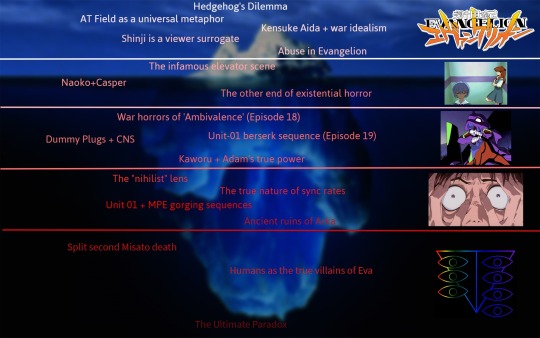
What keeps us all hooked to Eva time and time again? You get through your initial, confused watch of either Evangelion endgame, probably sometime in your adolescence wondering what the hell it is you just watched. The original source material is suffused with unsettling imagery, and sometimes too-close-for-comfort shorts. It’s so much to process that one watch is never enough. The imagery isn’t enough, however, because the mid-to-late-90s series comes with things you’ll pick up the more you focus on certain characters’ struggles or the interesting world-building. They arise little by little with every re-watch, adding onto what interested you in Eva to begin with.
There’s always that little voice asking you “What it is that really draws me here?”
Oh. The horrors.
The tragedy of it all.
These things never leave you the second you bear witness to them, whether you become aware of them or not. You’re disturbed over it, a tad worried, no doubt, but you’re strangely hooked.
Horror works better on limitation, it’s why found footage capturing pale, ghastly, monstrosities of the deep wood will always stand as exponentially terrifying. While most all of us have taken cracks at Eva’s budget at some point, that’s what really drives these terrors home. Its low budget nature made it work.
Evangelion has commentary which forces a viewer to reflect. Most no one enjoys that. It’s the fear, however, that has its audience come back. Evangelion’s reflection alone isn’t what gives Eva it’s charm decades after its run. It’s the little things, most everyone misses, the anxieties, the terrors, all of it. Most of those things, fly over a lot of fans’ heads.
Buckle up, there’s a lot to go through…. (warning for mentions of abuse, body horror, means of suicide, nudity, blood, and gore)
Table of Contents
I. Icebergs for Dummies
Tier 1: The Tip of the Iceberg
II. The Hedgehog’s Dilemma
III. The AT-Field as a Universal Metaphor
IV. Kensuke Aida + War Idealism
V. Shinji is the Audience Surrogate
VI. Abuse in Evangelion
Tier 2: Just Below the Tip
VII. The Infamous Elevator Scene
VIII. Naoko + Casper
IX. The Other End of Existential Horror
Tier 3: The Body of The Iceberg
X. War Horrors of ‘Ambivalence’
XI. Unit-01 Berserk Scene
XII. Dummy Plugs + CNS
XIII. Kaworu + Adam’s True Power
Tier 4: Pre-Abyss
XIV. The “Nihilist” Lens
XV. The True Nature of Sync Rates
XVI. Unit 01+ MPE Gorging Scenes
XVII. Ancient Ruins of Arka
Tier 5: The Abyss
XVIII. Split Second Misato Death
XIX. Humans Are The Villains in Eva
XX. The Ultimate Paradox
XXI. Conclusion
I. Icebergs for Dummies
For those unaware, the iceberg image illustrates that things are much deeper than they appear, just like an actual iceberg. You’ve probably seen this selfsame iceberg--- separated by tiers--- a few times looking through late night internet rabbit holes (Putting it out in the open: I’m personally guilty of this!), fictional or non. It helps you understand why you’re so enticed to certain material, that you’d revisit them. The highest parts of the iceberg are the things in the material most everyone knows, the surface level stuff. The lower you go, however, the lesser known the parts of the material are. These are the things the person are aware of.
Eva has some iceberg illustrations if you look around, albeit they don’t go through the more saddening, sometimes graphic factors of Eva, only theories navigating through Eva’s universe. Evangelion is so deceptively packed with blink-and-you’ll-miss-it subtleties that if an iceberg were centered on that, the diagram would be packed. And I’m being generous as I write this.
A few ground rules, before we begin: The iceberg will deal with the more obscure and dark material as the tiers get higher rather than it only being relegated to obscure bits. The lower the tier, the higher the iceberg and the more subtler the anxieties which graduate into horrors the deeper you go.
Yes, Evangelion is occasionally horrifying. No, Evangelion is not lovecraftian. I think people use the term lovecraftian way too freely. It’s not enough to see something with (sometimes too many) limbs twisted in ungodly angles. Or legs where legs shouldn’t be. The same applies for creatures assuming forms we don’t entirely comprehend. Eva has never delved into the angels being incomprehensibly terrifying specifically because they come from a cosmic expanse.
Some of these actual horrors, big and small, hit you after adolescence, something that makes you feel deeply for the characters’ dilemmas. It’s a feeling that grows and sometimes aches, rather than fades over time for many of us.
Tier 1: The Tip of the Iceberg

II. Hedgehog’s Dilemma
III. The AT Field as a Universal Metaphor
IV. Kensuke Aida + War Idealism
V. Shinji As the Audience Surrogate
VI. Abuse in Evangelion
II. Hedgehog’s Dilemma
Evangelion has its hand in so many psychological and philosophical cookie jars, from Freud, to Maslow, Johari, as well as Dostoevsky. The very tip of the Subtle Horrors of Evangelion Iceberg is something viewers are introduced to in the fourth episode of the series. It is one of the many psychological concepts dotted throughout the original show. Out of all those psychological concepts, this is the most explicit and most recurring.
The Hedgehog’s Dilemma describes the conundrum of two hedgehogs. The closer two hedgehogs become to one another, the more they harm each other with their spines. If you want to properly live, you need the closeness and intimacy of others. By allowing yourself to be close, however, you end up at great risk of being hurt. It’s the very reason what drives those who live to become guarded. Being perpetually apprehensive or building up walls isn’t a remedy for pains, however. The Hedgehog’s Dilemma isn’t just about why people become guarded after relationships ended on bad notes. It’s about the overall inevitability of pain.
Life is a continual push-pull of relationships, because we’re all creatures of comfort. We guard ourselves to varying degrees and sometimes even tell ourselves we won’t get close again, but personal comfort is one of our most ultimate drives.
The Hedgehog’s Dilemma not only describes that harm happens to us anyway, but illustrates that because comfort is universal we seek companionship regardless.
III. The AT-Field as a Universal Metaphor

The AT-Field is the most crucial rabbit hole in understanding the largest meta-narrative of Evangelion.
If Hedgehog’s Dilemma explains the what and the why people become more or less guarded, then AT-Fields explain the how. People build up walls around themselves all the time. You walk away from someone because they crack a smile at you... and it seems off.
Because you feel an anxious pang.
That’s an AT Field.
AT-Fields, or Absolute Terror Fields bear a few metaphors, one of which being boundaries. You see it as Shinji’s fear of becoming intimate, knowing the future implications or Asuka’s masculine protest (putting up a front). We can see an excellent example of the AT Field used by Asuka, her “Wall of Jericho” in episode 9.
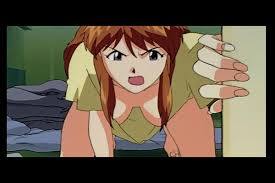
You also see it manifested through the angels, the strange creatures in Eva who supposedly desire to merge with Adam, their mother. Seeing this in the angels makes you realize that the AT Field is actually a metaphor for boundaries which implicates us all. In episode 22, Arael, 15th angel, seeks to understand Asuka. The angel uses its AT-Field (a beam of light) no, its boundary, to breach Asuka’s boundaries.


AT-Fields can be used to not only build up personal walls but to breach them as well. The irony of Arael’s action is that Arael’s AT-Field being erected while it floats just over Earth’s gravitational field makes it immensely similar to the Second Child; they’re both guarded.
The AT-Field is a funny sort of thing because it also sometimes explains how two people who are so alike can be guarded from one another. Sometimes you gain contempt for someone because they’re too much like your least favorable traits. You see this with Shinji and Asuka, both children without their mother desiring validation. Shinji calls Asuka a child midway into episode 9 and Asuka isn’t shy on voicing ideas of Shinji as dense or immature. They’re throwing stones in glass houses.
AT Fields are used to get the user out of dangers both physical and perceived. Sachiel, 3rd angel in the original series’ pilot episode, uses its AT-Field, in the form of flotation, to get itself from enemy fire. It never shows this until it is attacked first.
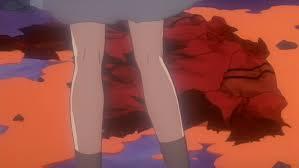
AT Fields are also responsible for one’s identity and physicality in Eva. Without the AT Field you don’t really exist. When Rei assumes the form of the person the character being cast into Instrumentality loved most in End of Evangelion, she’s causing the character to give up their AT Field. With that gone, they lose their physicality, turning into LCL (given the lovely term ‘tanged’ by fans). The ‘tanged’ individual suffers metaphorical death. Evangelion argues that in order for one to exist, others must perceive you and you must perceive you, a point best illustrated in episode 16. Since everyone is converted to LCL, no one really ‘exists.’ Rei describes this unnerving state as the inability of differentiating who you are and others, since everyone lacks a physical state without AT-Fields. Metaphorical death can be argued as worse than physical, since we all exist to make an impression of some sort. It’s what ties all the Eva cast together and the cause of their dilemmas. Validation. You can be living, yet very much forgotten or simply unknown.
There is living and there is “living.”
You can’t “die” unless someone knows you. You were never there.
AT Fields are the thing that make us live, but as a drawback, prevents us from understanding each other fully. Kaworu states in episode 24 that AT Fields are the wall of the mind and the heart of the soul, an unapproachable piece of sanctuary. When all else is taken from us, all we have left is our place of respite.
I’d also like to pitch the saddening reality that the AT-Fields are what prevent us from understanding angels as a whole, our genetic siblings as scared of this world as we are. The psychological angels want to understand us, that much is true. The angels, however, use forms of communication at the expense of our boundaries. Because people greatly value boundaries it makes it hard for us to comprehend angels. The creatures are hardly malicious when you realize they wonder why we all do things that actually hurt us, as well as the fact that they do understand our minds. But, because they breach our boundaries, we become even more wary of the (mostly) unknown. Angels may be us, but the strange forms they take are something we aren’t familiar with. The feeling is mutual with angels, wondering why there are many of us, our forms and outward appearances so identical. It’s a truth as old as time that we all fear the unknown.
The anxiety of an AT Field means comprehending that there’s very little chance to 100% get others. Because we’re all wary in some degree, because we’re set in an idea or perception of someone, even if the someone in the past no longer applies. It’s not healthy for you to continue dwelling on relationships not meant to be, keeping yourself up at night asking why, because both of you have closed off each other for good. There’s always that chance the other can come back and if they do seek to understand despite past hardships, that’s good. If they don’t, all you can do is move on and accept it.
IV. Kensuke Aida + War Idealism
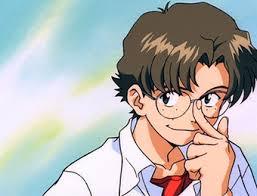
Kensuke is one of Shinji’s classmates, a supporting player in the series. He’s close with Toji Suzuhara, a boy who takes his anger on Shinji, after finding out that his sister has been injured during Shinji’s fight with 3rd angel Sachiel. As Suzuhara beats him down, Kensuke downplays the incident. Kensuke’s and Toji’s relationship is particularly interesting because the latter is affected to some degree by war (the war by humanity to prevent our destruction by angels). Kensuke glorifies the sentient, implicitly eldritch, multi-armored war-machines.
Kensuke can be best described as the ‘wow, cool robots’ drawing you’ve probably seen floating around. This is in relation to Gundam’s war commentary, but replace Gundam with Eva. Kensuke is enamored with the Evangelions and totally, willfully ignorant to the war horrors. Adolescents are forced to be the salvation of humanity, feeling every bit of damage to their own bodies whenever the Evangelion takes any hurt. Even after the war for humanity is long over, the pilots will be afflicted with traumas that will always hang over them.
Kensuke’s glorification is also what draws him to be Shinji’s friend. He uses Shinji’s status as a way of becoming a pilot himself by meeting up with Misato, putting himself at the cockpit of a strange creature magnificent machine.
When Toji becomes hospitalized after his battle in a hijacked Unit-03 vs. A Dummy System-controlled Unit-01, Kensuke expresses discontent at not being a pilot. He’s annoyed because “everyone” but him is a pilot.
Thing is, Kensuke isn’t heartless, just ignorant. Idealism is one of the uglier things that runs thick in the heart of Evangelion. His is one of many cases of unhealthy idealism in Eva, another example of making it difficult for those living to understand one another.
V. Shinji as the Audience Surrogate
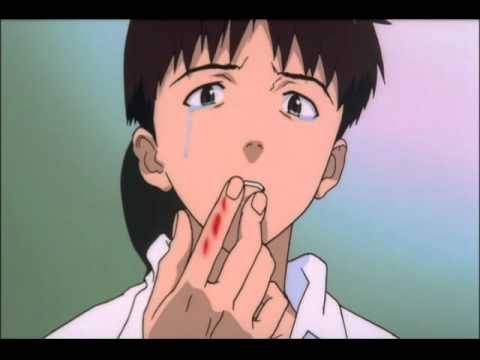
Shinji as the audience surrogate isn’t always touched up on, but is sort of understood subconsciously by a lot of the viewers. Shinji’s character is specific, yet so generalized that him being a surrogate for the audience just… works. Don’t believe me? Shinji gets two psychological exploration-based episodes whereas Asuka and Rei each have one. Episodes 16 and 24 are both psychological angel episodes, albeit the latter is more in-series subversive. The 24th episode doesn’t involve a breach of subconscious boundary, but the pilot (Shinji) is in the hot-seat, being made aware of their issues. Leliel, 12th angel, contacts Shinji in the former of these. Both characters talk to one another, shown as a series of horizontal lines and vertical lines, sometimes intersecting. These lines are a strong reference to the Johari Window, a tool in psychology which helps someone become more aware of themselves. The Window’s quadrants are as follows
1. the part known to the self
2. the part known to others
3. the part known to the self and others
4. the part known to no one
Leliel also states that the self only exists of one perceives themselves as well as others. The angel also states that Shinji could better his reality, to which Shinji absolves himself of responsibility by arguing the horrible state of his reality. It’s a subtle pushing to Shinji and by extension the viewer into free will. Kaworu builds up on these concepts with Eva’s in-universe concept for boundaries. Free Will versus Determinism is brought up here, with the idea that AT-Fields are brought up because the living (again, not people – emotional complexities aren’t only human) will them into existence. By exercising free will, it means enduring pain, one of Shinji’s, and again the audience’s greatest fears. Any relationship has pains and conflicts. This is all a buildup of free will, determinism, self-awareness, and the Hedgehog’s Dilemma. Understanding all of these means swallowing the “pain is inevitable” pill. The problem with much of us is that we like the idea of relationships rather than being in one. We want to feel validated but without the conflict, even if the conflict can be solved. We’re all Shinji because we’re all aware to life’s hellish catch-22s, so we run. There’s times in our lives where we run as far as possible from these woes, these truths, but there’s pain in running too. It’s why escapism seems like such a viable action for some of us.
Pain is inevitable, but pain can be mitigated.
More damning evidence to Shinji being a viewer stand-in lies in either endgame of Evangelion (pun intended). In EoE, after the Komm Susser Tod sequence of everyone on Earth being tanged, we’re treated to a shot of EoE’s live audience.
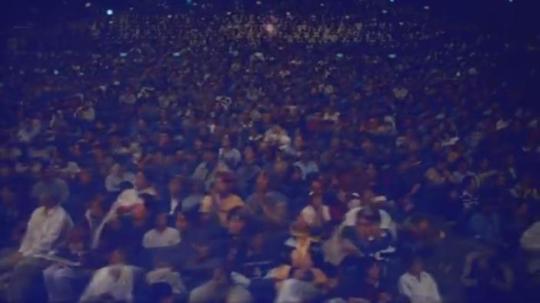
We hear Shinji’s voice about his reality while he talks to Rei toward EoE’s end. There are shots of the city, of people going about their daily lives cementing that this is about us. End of Evangelion shows us a less favorable side of Shinji, a departure from the lauded end series “Congratulations” scene, in which he does understand free will rather than perpetually dwell on negatives. Shinji reacts unfavorably toward Asuka in EoE after his mother’s speech to the audience that ‘anywhere can be paradise’ and Shinji stating he doesn’t know where his happiness resides. Shinji (We) still has a ways to go if he wants to be a better person.
It’s probably why many of us are either inclined to champion Shinji or harangue him, and either reaction is fair. Many of us are aware of audience surrogates, but never to this extent. Shinji isn’t his best person, but he can be. Being his best means self-reflection. Droves of people who first were exposed to Evangelion were teens, and again many of Shinji’s woes are specific yet so generalized, hence our feelings of defense and possibly disgust.
No one likes scathing, yet accurate call-outs on their person, but they’re paramount for us to understand ourselves and others.
VI. Abuse in Evangelion
One of the worst things recurring in all of original Evangelion is a bevvy of abuses.
Abuse comes in many shapes and forms and it’s many characters’ realities. Abuse happens not because the universe ‘wills it’ (determinism aka, ‘that’s just how people are’). Abuse, be it conscious emotional absence, actual neglect, among other ungodly acts fly though the cast.
Abuse is cyclical and a lot of those doing it often get away with murder because they have power.
Much of Eva is comprised of children being forced to sort through adults’ emotional baggage. Those children become adults and the cycle continues.
We all know a Gendo. Or even perhaps a Misato. Hell, even a Ritsuko.
Anno states that Gendo’s character is of a societal meta-text, which explains many viewers’ ire in relation to the character. He’s responsible for many of the seedy goings-on in Evangelion be it the financial (see: Jet Alone’s orchestrated out-of-control nature to give NERV more funding) or abuses (see: Rei, Shinji, Ritsuko, and, Naoko). It’s for this reason why Gendo’s actions are a sore spot for a lot of fans.
Anno: I’m not sure that it’s a real father [that Gendo represents]. Well, not a father in the sense of a parent with a blood relation to his child, but more, I think, [in the sense of being] a representative of society or the system. That’s why he has that expression.
Takekuma: So, he’s kind of amorphous.
Anno: The angels are the same. I made them appear amorphous in that way because, for me, society is unclear, the enemy is unclear.
Takekuma: Gendo is [a representation of] the boundries or the pressure of society itself.
Anno: That might be it. Perhaps Gendo is [a representation of] society itself.
http://wiki.evageeks.org/Statements_by_Evangelion_Staff
After many re-watches of certain Eva episodes, it just hit me, as I’m writing this why I’m sometimes apprehensive on an adult-exclusive lens of the show. This happens a lot in adolescence and our struggles are made trivial because of the mishandled baggage. As children, you’re meant to be subservient to parental whims. You have this sort of obligation to solve their problems. Give them closure. It doesn’t even need to be parental baggage, but just from adults in general. You see the way the adults act not just with the children but with each other. You see the way Gendo justifies neglecting Shinji, objectifying Naoko and Ritsuko or Naoko’s emotional absences as a mother to her daughter (also manifested through the MAGI). It’s these immature excuses as to why they can’t extend empathy to those around them.
It’s always excuses.
Eva’s original series has always been a show about children.
Tier 2: Just Below the Tip

VII. The Infamous Elevator Scene
VIII. Naoko + Casper
IX. The Other End of Existential Horror
VII. The Infamous Elevator Scene
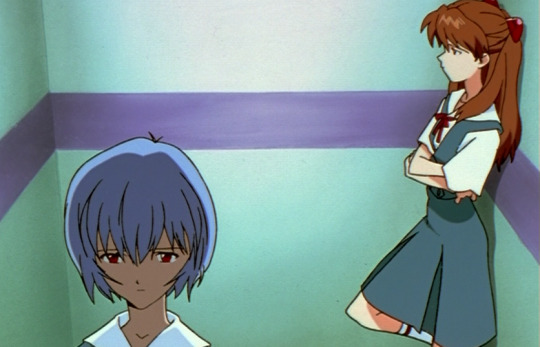
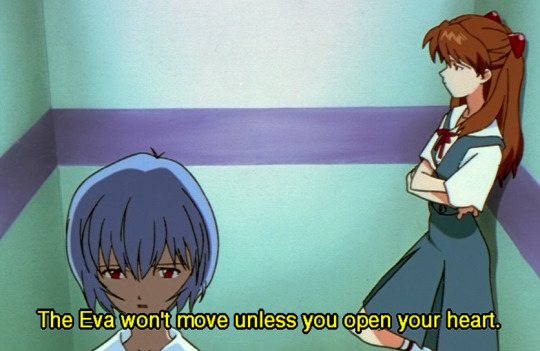
The Elevator Scene is a sequence that sometimes gets glossed over due to Evangelion’s fleeting budget. It took me years to realize the true gravity of the awkward silence of both the 22nd episode and its Director’s Cut version. The Director’s Cut version has Asuka abruptly jerking in the silence, but that blink-and-you’ll-miss-it moment speaks volumes. Understanding the scene means understanding why Asuka quietly stews in her anger. Understanding why Asuka stews means understanding Asuka from her debut to her emotional breakdown.
Asuka’s appearance in the 8th episode, Asuka Strikes!, is marked by a bold persona that carries on until the end. She isn’t shy on imparting her prowess to Shinji, stating that Units 00 as well as 01 were the prototype and the test type, respectively. Her Evangelion, Unit-02 is the finished product. She even states that she graduated from university. Despite these impressive feats so early in adolescence, the only time in which they’re noted is when Asuka talks of them. Misato takes in both Shinji and Asuka, but only ever “dotes” on Shinji. Gendo pays attention to Shinji because he pilots Unit-01, and 01 contains the soul of his late wife. Rei is the clone of Gendo’s late wife, hence Gendo’s attention and overall creepy, selfish obsession with her. Asuka and Shinji’s relationship, with Misato as their caretaker strongly mimics a Golden Child and the Second Fiddle. The only difference is, Shinji gains more attention due to Gendo’s and Misato’s respective baggage. Again, Eva is a series where children are forced to handle the baggage (with no break in the cycle) and when the child doesn’t have anything the adult particularly can clue in on, they become neglected.
That’s Asuka’s dilemma.
It’s why Asuka forces herself to grow up.
It’s why Asuka is driven to be competitive to Shinji and Rei, later growing contemptible at both.
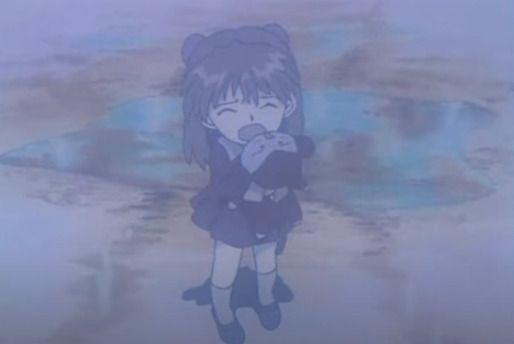

Asuka suffers a few curses, one of which being the youngest, the inevitability of being consciously sidelined dawns on her, leading to her selfsame breakdown toward series’ end. She aligns youth with trivialization, so naturally, she’d front with the opposite. She never gets help in relation to her period. Misato and Ritsuko realize something is up with Asuka but they never really offer her the support.
There’s also the flashback to her trauma in episode 22’s beginning. She’s replaced by her mother post-Contact Experiment (which led to a deterioration of her mental health) via a doll that looks like her, red hair in pigtails. It’s the leading factor to her feigned boldness, her ego. The way in which she is marginalized in the series brings it all back.
Rei breaks the silence with a few words of compassion and all Asuka can do is express disbelief. She mistakes compassion for contempt.
For pity.
The idea that anyone would extend kindness, especially now of all times, is unbelievable.

Asuka also experiences a dilemma here, a dilemma those like her face. She already knows what it means to be vulnerable and deeply hurt, but she needs to make herself vulnerable because now, more than ever, she needs the support. Being vulnerable will cause past traumas to flood back in full force, but by stewing she deprives herself of any support. Rei offers that support, but a few words of support in a wave of trivialization can’t help but feel a bit too strange.
Asuka’s greatest anxiety is realized in the twenty second episode. It’s of being and staying second fiddle, that she’s always been set up to fail. Even 2 episodes after the fact, in which she actually starves herself does she realize once more how she’s permanently ‘below’ others.
Asuka’s curse finds itself in real life, and it’s for that reason why I believe some find themselves resonating with her. Asuka’s gradual descent into bitterness is something I find myself waking up some nights thinking about after 7 years going through Eva; hers is a cautionary tale on being emotionally distant to cries of a damaged youth. Casually imparted knowledge of past achievements, and the competitive attitude mixed with embitterment, some of which from a genuine place but also a product of neglect. We were forced to play second fiddle, we forced ourselves to grow up to feel more legitimate, forced to carry an ire that stews because it seems no one listens.
VIII. Naoko+Casper
The late Naoko Akagi is a woman of multitudes. Those multitudes are compartmentalized into the 3 MAGI. They are Balthasar, Melchior, and Casper.
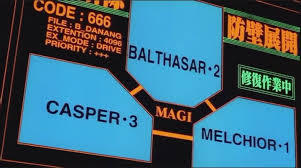
Casper shows itself to be the most prominent aspect of Naoko’s personality, her as a woman. Ritsuko states that, after the defeat of Iruel, 11th angel, that Casper is the part of her mother which remained that way to the end.
Balthasar and Melchior have been bested, be it by rival MAGI, or Iruel’s assault. This calls back to the fact that Naoko’s other facets aren’t anywhere near as prominent. Naoko has cited her own emotional negligence, of only showing emotions should it ever benefit her.
Casper on 3 occasions fights tooth and nail, Iruel’s assault, an attack by multiple MAGI in End of Evangelion or the defiance of Ritsuko activating the self-destruct sequence. Ritsuko does this to seek vengeance against Gendo for coming to the immense realization that he never genuinely cared for her. Gendo has always used Ritsuko for her body. This would destroy NERV, meaning killing herself and Gendo.
Then you realize why Casper overrides the sequence.
Casper’s stubborn behavior wasn’t actually to defend NERV but to protect Gendo. Casper’s defiance aka Naoko’s emotional absence toward her daughter allowed Gendo to kill a bewildered, rightfully angered Ritsuko.
The saddest part of Casper’s, no, Naoko’s choice is that Naoko got away with murder. Evangelion is a story about children dealing with the selfishness of adults and the adults never receiving justice for their wrongdoings. The relationship between Ritsuko and Naoko is an excellent example that this doesn’t just implicate the young pilots. Ritsuko dies in End of Evangelion with the truth that her mother, as a woman, in the end chose the man who manipulated both of them.
IX. The Other End of Existential Horror
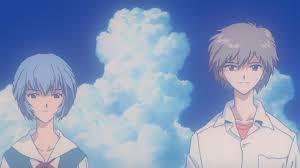
Some spend their whole lives trying to make a mark. Others can’t help but be known.
People get smart sometimes to get themselves out of a current situation. Kaworu and Rei’s existences are such that they’re deadlocked from living. Their existences are the product of an experiment, to be later heavily watched and raised as the Last Messenger. The latter is the result of Gendo’s obsession with his late wife.
Kaworu and Rei’s existential crises are opposite from the rest of the cast; while others do their damndest to become known, they cannot be unknown. Rei’s character centering more around her identity than other characters is also initially and sneakily alluded in the opening.

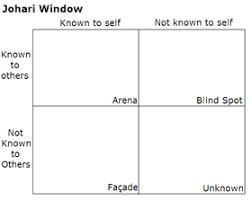
The Johari Window is a tool encouraging self-awareness in the person, alluded to twice in the show, with the second time being in the sixteenth episode. Both usages of that illustration, for Rei, and Shinji drive home crucial aspects of the meta-text.
This would also tie Rei to Shinji in End of Evangelion forcing Shinji to reflect on his own awareness and will. Rei is an astute, young girl whose arc is about her personal relationship with identity, something she is all too familiar with due to her objectified nature. Rei’s arc is even more so entrenched in identity than other characters that she is one of the characters imparting personal and universal realities.
Ayanami Rei’s existence from start to finish is inundated with the issues of others, causing her to internalize being always expendable. In Rei’s Poem in episode 14, it becomes clear that she sees herself based on usage. She likens herself to a field of flowers, which slyly alludes to the Dummy System’s “parts” 9 episodes later, other Reis.

Rei is seen as malleable vessel which houses thoughts rather than her own person and she can’t do anything about it. So she resigns to her reality. Even if she does tell off Gendo in End of Evangelion for his objectifying, she’s not even out of the woods. She never will be.
I used to think Rei’s “slap” to the face to the man with the (most) baggage was empowering. Then I learned about abuse during adolescence, how kids who lack a support system act while away from their abusers. Even saying an emphatic “fuck you” to your abusers isn’t enough to be a happy ending. Rei is a girl who lacks a support system and she suffers from it. Start to finish.
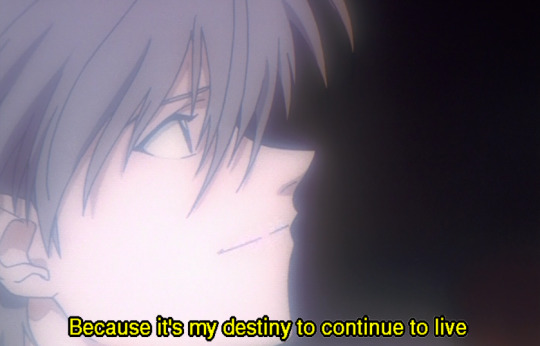
Kaworu’s crises are much trickier to pinpoint because there’s so little to work with. He doesn’t get an episode dealing with personal, subconscious explorations. Getting his character means first getting how Evangelion re-contextualizes what “Ode to Joy” symbolizes. It also means understanding the AT-Field and most people won’t pick that up on an initial foray. Or maybe even a second. Most people don’t pick up that the AT Field implicates anything living and physical or its metaphor for boundaries and identity. There’s the common misconception that Evangelion is a “human” show.
Kaworu marks off his appearance humming “Ode to Joy” while Shinji wonders who to turn to. It’s a song generally known for its jovial nature, but most importantly, Ode to Joy is:
known also as the “Choral” Symphony. Its finale is a musical setting of Friedrich von Schiller ’s “Ode to Joy,” a hymn to the unity and freedom of humanity.
http://www.dictionary.com/browse/ninth-symphony
The Choral Symphony assumes a more horrific context later on. Kaworu is the last messenger and what his action is would lead to the mass annihilation to lilin/human or angels. ‘Unity of man’ is changed in Eva’s context – it marks either unity of man or the death of man. It doesn’t matter who Kaworu allows unity to, because his hands would be stained with death anyway. Then you realize why Kaworu deploys his most powerful AT Field during his descent to Heaven’s Door.
This is his reality.
Kaworu’s status as the Angel of Free Will isn’t about him being the only complex angel, as a lot of people think. It’s about being the sole individual handing that freedom to others.
You realize his terrifying dilemma goes to the tune of being feared for his own existence as an angel (which he notes to Shinji) and not being able to properly live.
Sometimes you ”hurt” people by existing.
Sometimes people hate you for the simple act of existing.
Kaworu’s and Rei’s terror is the other end of existential horror, that you can’t help but forced to be known. Sometimes you have knowledge but aren’t allowed to do much with it.
Tier 3: The Body of The Iceberg

X. War Horrors of ‘Ambivalence’
XI. Unit-01 Berserk Scene
XII. Dummy Plugs + CNS
XIII. Kaworu + Adam’s True Power
X. War Horrors of ‘Ambivalence’
Episode 18 is where anxieties graduate into horrors both implied and visceral. Unease hangs over the episode, with the mystery of Unit-04’s disappearance and tests being done on Unit-03. Misato tells Shinji that because tests would be done, there’d be a pilot there. Misato uneasily withholds this info from Shinji and Kensuke breaks the silence with his recurring desire of being a pilot, still ignorant of the war horrors. There’s a subtlety that Shinji picks up on with Toji but not enough to put two and two together: that the big-eater himself isn’t feeling so hot.
The continual chirp of cicadas and birds nor the peel of the school bell are enough to break the unease of the viewer or of Toji. Toji goes from indirectly being affected by war vs angels to being chosen, drafted even, a child at the first line of defense for the apocalypse. We get a flashback of him beating down Shinji, before it cuts back to present day Toji. He will be in Shinji’s shoes.
Toji balls a fist, a recurring theme in Eva, to the tune of “What is your hand for?” Toji is finally about to take things into his own hands.
Asuka takes a few cracks at Shinji to Hikari that he hasn’t quite gotten the memo, but when Shinji asks her even she’s halted in words.
Then the day comes.
Tests are being done and suddenly Unit-03 goes rogue with Toji in her (note the Evangelions have the souls of the pilots’ mothers, save for Rei). Unit-03’s’s strange behavior is revealed to be the work of the 13th angel, Bardiel. Shinji’s ignorance is made worse by Misato’s absence (with Misato telling Ritsuko she’d tell Shinji the pilot’s info after the tests). Units 00 through 02 are sent out for the new threat and Shinji sees this new threat. Anxiety rises.
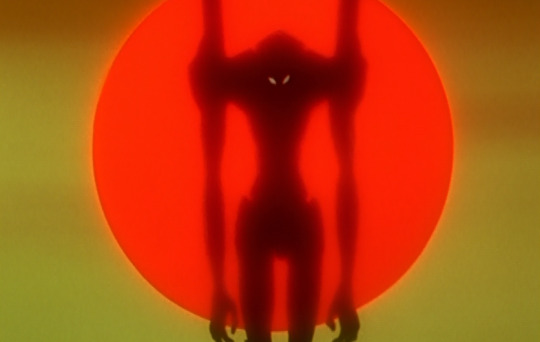
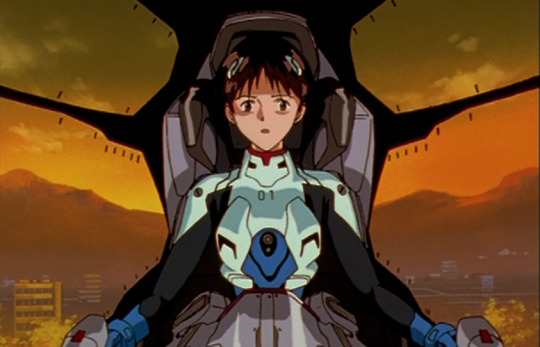
The song “Marking Time Waiting for Death” accentuates the anxiety. Unit-03’s silhouette eerily contrasts with the sun, her body slightly hunched and approaching slowly.
Fear washes over Shinji when he deduces that with an Evangelion inside, there must be a pilot.
Yet he still doesn’t know.
The other pilots are aware, and show reluctance to the revelation. A hijacked Unit-03 sets herself on Asuka, Rei, and even strangling Shinji. Shinji allows the angel-hijacked-being to strangle him, because killing another human being is simply horrific.

Eva has its hand in the war morals cookie jar here because Shinji stands at a conundrum, to other let this creature take his life or to murder flesh and blood. This dilemma goes double-time in war. Gendo asks why Shinji hasn’t dealt with the 13th yet, with a somewhat horrified Shinji pleading about the pilot. Gendo commands for the unfinished Dummy System to override Shinji’s controls and then suddenly...silence….
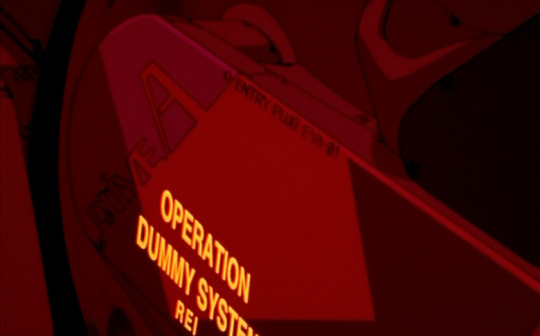
The Dummy Controlled Unit-01 springs back and we’re treated to a close-up of Unit-03/Bardi3l being strangled.


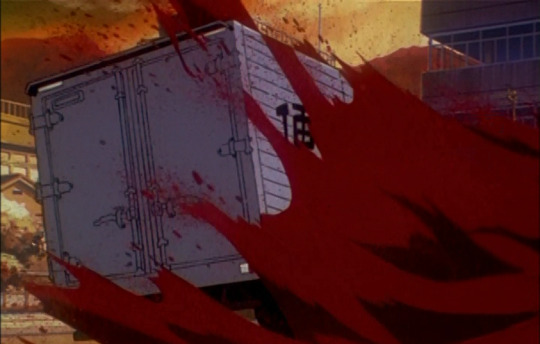
A nauseating crunch sounds and the unit goes limp. A controlled Unit-01 proceeds to raise hell on the incapacitated enemy, resulting in the unit’s blood and guts flowing through the streets. NERV’s personnel can’t do anything save for become fearful at the Dummy System’s capabilities. Terrible, visceral noises sound one by one as blows strike, as the unit’s severed limbs and blood splatters riddle the urban battlefield. Shinji hears every second, every squelch and splat.
Imagine the pain of 03’s pilot.
But the terrors don’t cease here.

01 doesn’t stop at just raising hell on the incapacitated 03, and we’re treated to another close-up shot of 01 tightly holding onto 03’s entry plug, before crushing it.
Somewhere away, Misato receives news that Unit-03 has been dispatched as an angel. Shinji feels the weight of having actually killed someone, before Misato actually breaks the news that the pilot is not only alive but that the greatly injured pilot is his classmate.
It never really hit me until now how this scene holds another horrifying subtlety. Compare this to episode 3, where Toji’s first interaction with Shinji involved him punching him, the very scene playing at this episode’s beginning. The 18th episode ends now with ,Toji and Shinji are both joined in the same camp, of children emotionally and physically marred by war, not able to fully control their situations.
XI. Unit-01 Berserk Sequence
Shinji stands in a situation where he can no longer take the terrors aligned with the Evangelion. He’s gone from sustaining injuries great and small from combat with the eldritch angels, to indirectly harming a friend through it. He resigns from his position as a pilot, understandably running away even with the approach of the 14th angel.
After a talk with Kaji about how he can control his future and he only, Shinji once again puts himself at the forefront of further pains. He must once more thrust himself to the terrors that align with the war-machines whilst struggling with other traumas.
During his fight against Zeruel, his Evangelion dies out and it all floods back to him. Shinji once again finds himself at a position of no power, frantically pressing at his controls to no avail.

He can only hear blow after blow of the 14th’s onslaught. He and Unit-01 are at their most vulnerable.
Until Unit-01 springs back.
W hat follows is the famous Berserk sequence, a scene whose terror can be thanks to Evangelion’s low budget.
We see the Evangelion in all her terror and the sort of off-ness that carries in this scene.

Episode 19 has no problems on treating us to front-row tickets to terror.
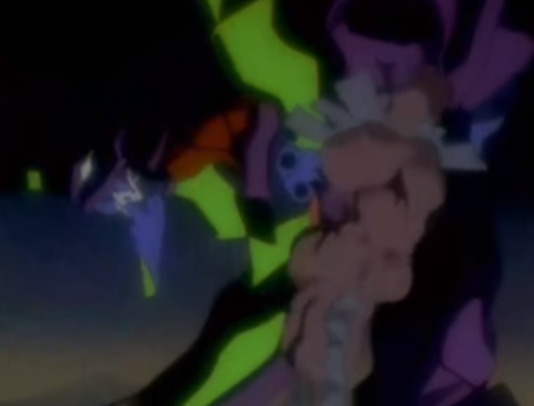
Unit-01 snatches part of Zeruel’s appendage and adds it to her mass. A sickening squelch sounds and her new appendage contorts into place in an instant.
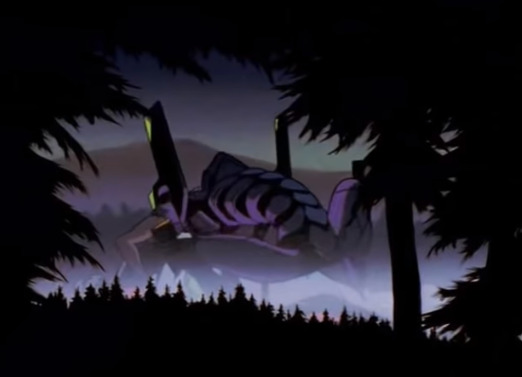

She moves over to her incapacitated, angelic meal and doesn’t hesitate to chow down. The shots feel too personal yet nowhere near in the sense of the show’s meta-textual reflections. It’s almost like stumbling on a cryptid and when she shoots a look at the viewer, it feels as if she’s looking at us, like we’ve interrupted her dinner. Or perhaps she did finish the meal... and she’s in the mood for seconds? Perhaps even thirds?
The bizarre and eldritch nature of the Evangelions goes full force with this imagery. Episodes 2 and 16 laid the foundation of how off the Evangelion Unit-01 was with how she openly mutilates her targets. Or even the unsettling roar of Unit-01 that’s not entirely bestial. The sound is straddles a line between the blood-curdling bestial and the human. But here? Eva Unit-01’s position, from her hunched figure, to her more feral position as she feasts, feels far too organic...and far too human.
The Evas themselves aren’t human, but the souls housed within are. Eva’s souls are souls of the respective pilots’ mothers, an example of the mother and child symbolism omnipresent in Neon Genesis Evangelion.
Shinji’s mother is Yui and as we go through the series, we realize the s2 engine appliance was intentional. An s2 engine offers infinite stores of energy and this is needed for Instrumentality. With the s2 engine within her grasp and the fact that Evas don’t subsist on anything, this would make the consumption of 14th completely recreational.
It’s super tempting to frame this scene as containing some abomination that now stands unchained and indiscriminate in its targets, but it isn’t. It’s sort of understandable because Units 00 and 02 don’t come close to exhibiting this sort of behavior nor were they in this circumstance. Neither Unit-00 nor 02 have any desires in regard to Instrumentality. In the end, we should look to Yui and her own endgame, because Yui’s running the show here.
XII. Dummy Plugs + CNS

Ritsuko states the Dummy Plugs are machines which imitate pilot’s thinking. There’s a bit more than the possibility of this being 100% AI due to the apparatus Rei is in.
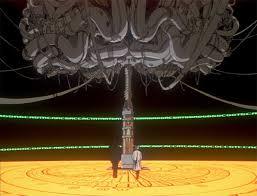
This very likely implies the respective person’s thought processes added with AI programmed in a way which best “describes” the pilot (basically how they are perceived). In episode 17, Rei is situated in this apparatus strongly resembling the central nervous system, the brain and the spinal cord.
{The central nervous system CNS is responsible for integrating sensory information and responding accordingly. It consists of two main components:
1. The spinal cord serves as a conduit for signals between the brain and the rest of the body. It also controls simple musculoskeletal reflexes without input from the brain.
2. The brain is responsible for integrating most sensory information and coordinating body function, both consciously and unconsciously. Complex functions such as thinking and feeling as well as regulation of homeostasis are attributable to different parts of the brain.
https://mcb.berkeley.edu/courses/mcb135e/central.html
Ritsuko imparts the unsettling revelation about Rei and by extension the Dummy Plant itself (after Misato coerced her into learning about Rei). The Reis are the core of the Dummy Plugs (and the System used to brutalize a hijacked Unit-03 and its trapped pilot). This scene adds more to the extent of Rei’s objectification, of her being replaced. It adds on to Rei III’s comment of being ‘the third.’
Rei isn’t savage by any means but the sheer brutality of Dummy System’d Unit-01 5 episodes prior may hint at her straightforward nature.
I’d like to pitch that Ritsuko’s approach to Rei’s Dummy Data was also the product of her subtle animosity toward Rei. When she refers to the Dummy Plug as a machine which mimics human thinking, she’s talking about Rei. She also refers to her similarly in episode 23 by referring to Rei as spare parts, as if Rei herself is some soulless machine whose parts can be switched out if need be. This could also call back to Rei’s poem, in which she calls herself a vessel which holds human thoughts.
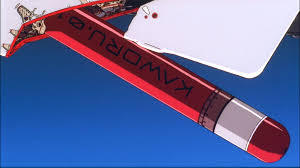
Another question remains: how does Kaworu play into this?
The MPEs (the Mass Production Evangelion series) use Kaworu’s Dummy data, meaning that there are cloned Kaworus stored off somewhere, perhaps floating with soulless smiles the same as Rei has.
Treated as spare parts.
This also implies that Kaworu is more or less reduced to an object.
What’s more disturbing is the nature of the MPEs gratuitous method of ravaging and mutilating Unit-02 and by extension Asuka.
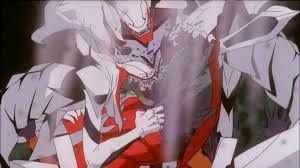
Kaworu hasn’t ever demonstrated any degree of malice, so this can’t really insinuate a ‘Kaworu is secretly evil’ narrative. But this can tie back to a recurring theme of humans fearing and despising angels. It’s because of this that the revelation of our genetically identical nature or the fact that they can comprehend our psychology is framed in-show as kind of shocking. It is because we’re so disturbed at the angels’ existence (or anything else we don’t comprehend) that we view them as inherently savage in nature. Kaworu’s quick-to-perceive personality most likely translated itself along with the AI. This would also rule in the somewhat strategic way in which the MPEs act against Asuka, exploiting her attack patterns through surprise attacks.
Some of Kaworu’s as well as Rei’s Dummy Data are the product of universal (Kaworu) and personal (Rei) contempt by people. Let that sink in.
XIII. Kaworu’s + Adam’s True Power
The bottom of the fridge horror portion of this iceberg is something that has subtly plagued me for years. We’ve only ever caught glimpses of Kaworu’s abilities in his debut episode. I picked up on it little by little with each re-watch of the episode, with every other time his abilities dawning on me. If I wasn’t focusing on how his character fits in the greater framework of Evangelion, I was cluing in on his abilities.

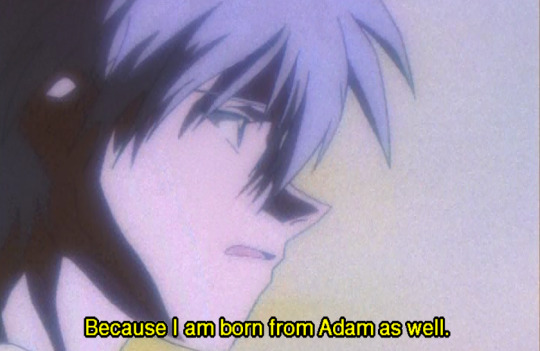
One of his abilities is being able to block out light, magnetism, and subatomic particles. Some of the forces which make up the universe. This witnessed by the viewer when he realizes the whole of humanity’s welfare hangs by a thread, due to the coexistence of angels and Adam.
Adam.
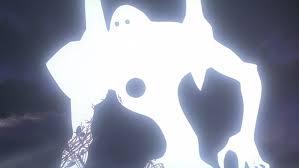
Adam’s soul lies within Kaworu. Adam. Who utilized an Anti-AT Field which caused Second Impact. An Anti-AT Field, which killed off much of the Katsuragi Crew in Antarctica.
This makes Kaworu the most powerful angel in the original Evangelion series.
Eva has shown that ownership of an angel’s soul (or partially, if you’re onboard the Rei I is in Unit-00 theory) allows the person to inherit the angel’s abilities through Rei. Rei blocks off Kaworu’s immensely powerful field with one of her own, canceling out both as a result. As we know, AT Fields for people are a figurative affair. People lack the physiology to exhibit a physical AT Field because they don’t have cores like angels do. Angels’ souls when possessed by humans have a sort of ability to circumvent parts of human physiology (if you’re looking for the whole package, you should eat angel’s flesh too). Rei also shows the ability to float, implied in episode 24 and shown explicitly in End of Evangelion.
But this raises a few questions about the last messenger is the ability to block out some of the forces of the universe Adam’s powers or Kaworu’s? Another ability that continues to plague me the more I think about it is Kaworu’s AT-Field usage on Heaven’s Door to bypass its lock.
We haven’t actually seen Adam’s other powers (if the angel has any) because the it’s anti-AT Field was halted via Lance of Longinus. Other than its ethereal appearance in flashbacks, we only see an incapacitated Adam in embryonic form. That’s it. We don’t know if Adam exhibits any other powers due to this impediment. If Adam does have more powers, this would add onto both the fridge horror factor of Adam and Kaworu.
Tier 4: Pre-Abyss

XIV. The “Nihilist” Lens
XV. The True Nature of Sync Rates
XVI. Unit 01+ MPE Gorging Scenes
XVII. Ancient Ruins of Arka
XIV. The “Nihilist” Lens
There’s something that implicates the whole cast. Something that goes beyond the meaning of the AT-Field, and the all-too-known Hedgehog’s Dilemma.
Eva is filled to the very brim with psychological concepts, but there’s one thing which ties this all together. It goes much larger than the desire to become validated or cycles of abuse and unresolved issues to a newer generation.
Free Will Vs. Determinism ties the entire cast together and is disturbing in its own right. It not only ties the cast together but also contributes to Eva’s meta-narrative.


Episode 16’s sequence with Leliel, Shinji, and the Johari Window gives little breadcrumbs to this psychological dilemma. Leliel teaches Shinji about his own identity as well as slowly ushering him to a sense of self-awareness. Leliel also attempts to usher Shinji out of filtering reality with only convenient parts. Shinji argues that he can’t really be held culpable for his actions, because the one and only reality is that reality is awful, bar none. Not his reality, but reality as a whole. This deterministic stance becomes ever more blatant 8 episodes later with the appearance of Nagisa Kaworu.
Kaworu’s designation is the angel of free will. The irony of this stands in the fact that Kaworu isn’t the only angel who can exhibit free will (with some of the angels before him taking the time to try comprehending people). Kaworu’s status comes from his identity as the last messenger, bringing about freedom for one species (humans/lilin or angels) at the expense of the other. Kaworu knows his reality well and in the end, seeks to better the reality of those around him. Eva doesn’t romanticize the prospect of free will, however, because Kaworu is so aware of his own person and how he can hurt those around him that it greatly bothers him.
The metatext doesn’t just position Shinji as being in the wrong, but also the audience. Remember the point I made before about Shinji being the audience substitute? It’s further hammered home from the series’ tail end and into End of Evangelion.
“That’s just the way things are.” is a common response to things in life we feel resigned on changing, because we don’t know how to change them. This quote is a parallel to Shinji’s “humans aren’t made to float!” in episode 16.
Shinji does know how to change much of his reality, but by doing so he’d be pushed into free will. Free Will is the solution and it means holding yourself accountable rather than believe that it’s everyone else with the problem. With the idea that you can change your reality, it offers you the opportunity to love yourself.
If you love yourself, then it becomes much easier to love others.
Eva’s free will and determinism metatext hammers home the extension of empathy.
Shinji/the viewer’s greatest problem is that because we don’t love ourselves it makes it difficult to extend the love to everyone else. Shinji’s love translates as idealism. Because of his unhealthy idealism, he is hindered from understanding people.
By ascribing your beliefs from determinism to free will, it opens your mind to an entire world of possibilities, but therein lies the terror. It is because of these possibilities that Shinji and by extension, the viewer, likely fears free will. Shinji finds ways make himself validated, but with free will, the argument could be made that it doesn’t matter. There’s the anxiety-crippling likelihood that none of it actually matters, because your existence doesn’t matter. If we’re going on this bent, acts of making an adequate impression on others are acts of personal denial. In the end, these are what they are, possibilities.
The greatest terror of it all is that we don’t know.
User power-chords makes an excellent point about the inherent darkness of an internal locus of control.
User power-chords posits the idea of existential absurdity for Shinji not as a certainty but a possibility. There’s always a likelihood that our desires to comprehend the world around us, to find ultimate understanding are in vain.
Cheesy as it sounds, people fear ambiguity because we seek a satisfying end. We don’t just seek answers. We want outside closure and inner peace, but we won’t always get it. It’s why we rationalize relationships that end on bad notes. Sometimes you worry about your falling-outs...and it hurts. You never got the answers your wanted so this pain carries, for months, sometimes even for years. Dwelling on the issue serves no purpose other than to keep that hurt with you. The best thing to do sometimes is to find your own closure, your own meaning.
No, Evangelion isn’t actually pro-nihilism, but it presents us with that likelihood. That’s what makes this aspect of the narrative so terrifying: The consideration that we find meaning in the meaningless.
XV. The True Nature of Sync Rates
The nature of injuries and having them in adds onto the innate horror --be it war or otherwise-- and themes of the Evangelion. The severity of the injury is based on how high the pilot’s sync ratio is. An average rate while sustaining damage will bring hurt to the actual pilot in the respective spot. Some examples:
Sachiel makes multiple headblows to Unit-01 and Shinji in episode 2, causing head trauma.
Ramiel’s, (5th angel), particle beam attack in episode 6, an attack so severe that Shinji needed medical care.
Unit-00 and Rei being infected by a Bardiel hijacked Unit-03 in episode 18. Toji’s condition in episode 18 stands as a large example of the innately disturbing nature of sustained injuries.
Toji’s condition becomes all the more nauseating when you see Evangelion parts and blood flow through Tokyo-3.
Toji could feel every last second of strangulation, body blow, and feel the unspeakable pain of his arm being severed. Let that sink in.
Asuka receives the worst of these considering the nature of her sync rate being high. The higher the rate the more kept the damage is. The circumstances behind Asuka getting the worst of it goes back to the AT-Field. Asuka understood the meaning of the AT-Field, that the more you open yourself up to others, the more hurt you become. The realization dawns on Asuka as her mother from within the Evangelion shields her from the onslaught of JSSDF troops.
It’s then that Asuka finally comprehends what the Absolute Terror Field is. Despite her emotional needs being neglected, realizing she’s set up to fail, and going comatose she still goes on.
Asuka, despite everything, takes a chance and opens her heart knowing the double-edged nature of the AT Field. What happens next?
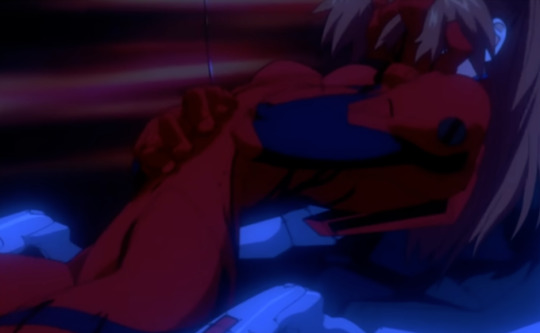
Asuka took a chance.
She opened her heart...
...and she got hurt all because she opened herself.
XVI. Unit 01+MPE Gorging Sequences
The brutality of both Unit-01 and the Mass Production Evas holds three layers: of visual horror, implied horror, and thematic horror. Unit-01, after taking Zeruel’s s2 engine into herself, proceeds to then brutalize the 14th angel by way of still gorging on it. The feeding was entirely recreational considering Evangelions don’t subsist on food to function. This was more about the sheer act of brutality for brutality’ sake.
The Mass Production Evas also fall under this category, the way in which they deal with Asuka after incapacitating her with a replicated Lance of Longinus is also sadistic and gratuitous. They also proceed to gorge on Asuka, her fate made worse through the simple fact that her sync rate is heightened.

The MPEs don’t even swiftly finish her off. She is in a state of tremendous and unimaginable pain. They fly above her slowly, circling above her mangled Eva.
They are almost mocking her as she can do nothing, save for writhe. Asuka’s seething, repeated “I’ll kill you...I’ll kill you….” is then silenced by the MPEs spearing her down.
The brutality doesn’t end there, as we see much darker implications of the damage sustained toward the end of the first half of End of Evangelion.
Shinji bears witness to the implications after seeing the decimated remains of Unit-02 being carried off by some of the Mass Production Units. The sickening reality of it all dawns on him and he is once more exposed to the woes of war and the nightmarish aspect tied of the Evangelions.
XVII. Ancient Ruins of Arqa
We’re ending the pre-abyssal end of the iceberg with Evangelion’s original proposal.
Eva’s proposal, a far cry to the show today, had a more sci-fi angle to it. Psychological concepts weren’t exactly pitched nor was it self-aware. The angels weren’t even referred to as the angels, but as the Apostolos. Instead of the 18 we were presented with in the original show and the movies, there were 28 Apostolos.
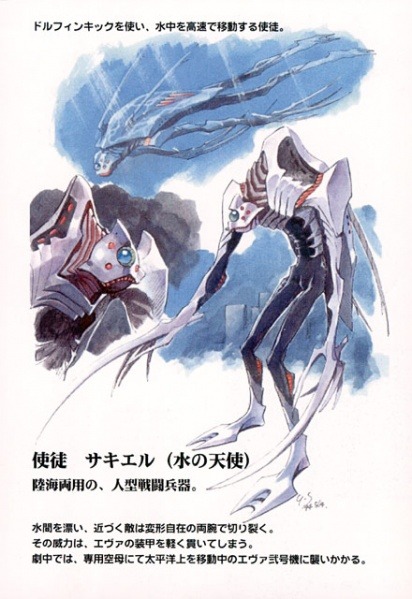
The Apostolos designs stand as testament to how far of a departure the proposal was to the final cut. They look far more menacing than the more amorphous, much softer defined, beady-eyed angels we’re used to. To top it all off, the Apostolos were the de facto villains of Evangelion’s prototype pitch. The Apostolos in the Proposal, toward the end, proceed their onslaught as a group rather than the series’ one by one. Toward the series’ end, the 12 strongest Apostolos begin their assault on North America, annihilating the continent in its entirety.
Only 12 of the creatures laid waste to a singular continent.
Episode 24: "Now, the Promised Time"
Rei breaks down. Her secrets are revealed. At last awakened, the twelve strongest Apostolos descend from the Moon. Both Eva Unit-06 and the American continent vanish completely. Humans acknowledge their helplessness in the face of the Apostolos' crushing power. The promised time, when people will return to nothing, approaches. A human drama in the depths of despair.
Episode 25: "Arqa, the Promised Land"
The laboratory holds the ancient ruins of Arqa, which have become key. In order to stop the twelve Apostolos, the United Nations' head members annul the Human Instrumentality Project and resolve to destroy the Apostolos. Shinji's father objects. Shinji and the others stay at the laboratory for Rei. A drama of people conflicting over incongruous objectives.
https://wiki.evageeks.org/Resources:Neon_Genesis_Evangelion_Proposal_(Translation)
The aforesaid creatures were so powerful in the original pitch that Human Instrumentality and the ancient ruins of Arqa would be the way of stopping the onslaught.
Tier 5: The Abyss

XVIII. Split Second Misato Death
XIX. Humans Are The Villains in Eva
XX. The Ultimate Paradox
XVIII. Split Second Misato Death
As the last and most explicit aspect of original Evangelion, it would only make sense that EoE specific content would take its place in Tier 5. End of Evangelion is a 90 + minute tour de force with disturbing imagery back-to-back. Split Second Misato Death refers to one of the most unsettling images sprinkled all throughout the movie. Here are a few of the many examples of EoE’s building up on Evangelion’s ugliest parts.
Everyone cites the infamous hospital scene not even 5 minutes into the film as the first proof, but user power-chords has pointed out, Shinji has actually attempted suicide (refer to the ‘Free Will v. Determinism’ part of the iceberg.)
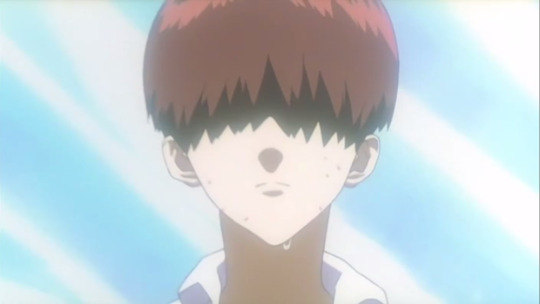
After Misato is mortally wounded and sends Shinji off in an elevator not long after, the JSSDF blow up that part of NERV. A few people have pointed out the most disturbing facet of this scene: through freeze-framing that you can actually see Misato’s body during.
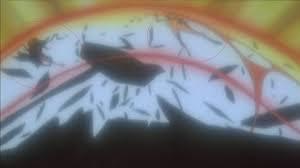
The JSSDF scene partway through End of Evangelion in which NERV personnel are summarily annihilated.
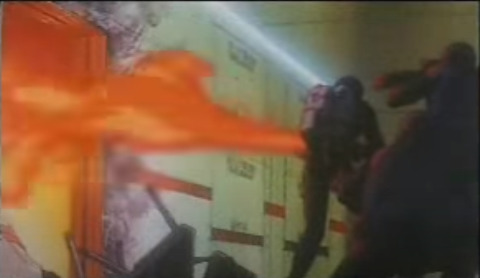
For those missing the small detail of Shinji’s attempted suicide ,Shinji’s depressed state is made more clear when the JSSDF locate him. When they do they attempt to kill him execution style. Shinji doesn’t move.
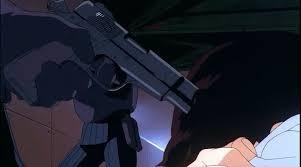
“I don’t want to die…!” during the JSSDF’s assault, Asuka is awoken from comatose state. She is protected by her mother via an AT-Field by Unit-02. She gains back her self-preservation after this realization, and multitude of images play. One of them is an extremely gruesome close-up of Asuka’s face. (extreme body horror warning, proceed with caution)
The Komm Susser Tod scene beginning with Shinji strangling Asuka in harsh coloring, Naoko’s same action toward Rei plays right after. A few disturbing child drawings follow after, predominantly featuring death. (seizure warning, body horror warning)
End of Evangelion’s flooring nature comes from the fact that it builds up on the subtly horrific and makes these terrors explicit. Whatever existed beyond closed doors becomes now available for us to see,
XVIII. Humans Are The Villains in Eva
At the penultimate point of the abyss lies a horror as old as much of time. Of the humane being more disgusting than the monsters.
That we can be monstrous.
This fact becomes known with the appearance of the JSSDF as dispatched by SEELE, methodically mowing down NERV personnel with little to no weaponry of their own. We’re treated to NERV’s personnel in their hallways, some forced with the moral dilemma of leaving their own to die while surviving or helping their own while both end up being gunned down.
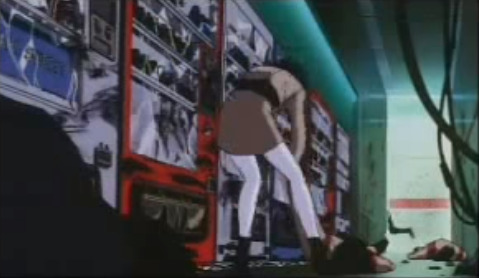
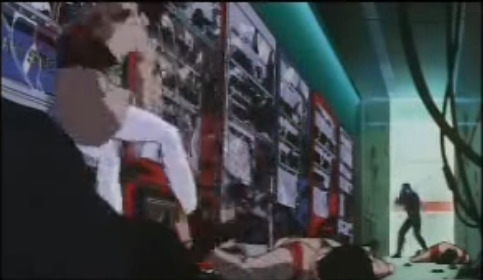
It becomes apparent that SEELE has been gradually, intentionally chipping away at NERV’s Defense Budget, getting rid of the (little) competition they have after the defeat of the Last Messenger.
There’s a degree of contempt and casual sadism that comes with how they kill the personnel. In one instance, a NERV worker surrenders to the JSSDF, before being killed off in execution style in the distance (one headshot plus two extra shots for good measure).
When you look back at it, this sort of sheer, unabashed brutality wasn’t felt about the angels. Human attitude about the angels is largely fearing, anxious. This attitude accentuated itself through a sometimes nervous soundscape. Of observing these weird, ghastly creatures as they creep and swim. And the feeling’s mutual. The problem is that we don’t know.
But here? We do know.
When the JSSDF move in, the anxiety of angels graduates to the full-force dread of creatures that have killed before. The greatest enemy to humanity has always been with them all along, forcing them to a catch-22. The dread falls on Maya because she understands this perfectly. NERV has only ever shot at targets rather than living flesh…
...and SEELE knows this.
SEELE’s slow, but sure suppression of NERV’s budget is kicking a man while he’s down, but the man in question is a child instead. The JSSDF have more than enough firepower, calling it overkill goes beyond an understatement.
The JSSDF demonstrate the lack of remorse further with the discovery of Third Child, Shinji Ikari. One of the members presses the barrel to Shinji’s head before Misato steps in and kills the members.
The JSSDF isn’t the only damning evidence of how ugly members of humanity can be, however.
Humanity’s on-occasion grossness shows itself in small ways throughout the series, in dislike and conscious emotional distance for individuals, or beliefs of the angels being unintelligent and/or savage. Other times it manifests fiscally, in orchestrating more ethical approaches to stopping certain destruction to go seemingly haywire in order for NERV to receive more funding. This all due to a rival company of NERV challenging the very idea for its usage of child soldiers.

The worst of this damning fact is that many of the morally repugnant members exist on a higher echelon of society. There are Gendos running around, doing as they so please and they’re the tip of their echelon iceberg.
XIX. The Ultimate Paradox of Evangelion
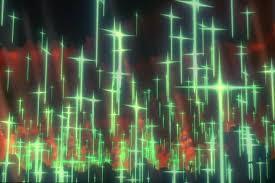
“Anywhere can be paradise as long as you have the will to live.”
We’re treated to these words as Shinji finds himself on shores surrounded by an isolate hellscape, with Asuka next to him. The strange and altogether horrific nature of End of Evangelion has gotten fans believing on End of Evangelion’s endgame was in certain, nihilistic. But Eva dipping its hand in the likelihood of meaning in the existentially meaningless isn’t even the ultimate terror of Eva’s self-aware universe, nor is it the tendency for man to become contemptible towards itself.
Evangelion greatest terror is the paradoxical nature of free will.
Yui’s words to her son as she drifts off into the ever-expanding cosmos, her status as a deity realized, is that paradise is universal. EoE assumes this unconventionally positive approach to a whole series worth of characters’ woes. The issue is: finding paradise is ultimately conditional.
Free Will’s paradoxical nature is what gives credence to the ongoing Free Will vs. Determinism dilemma. People can use their free will to take away yours entirely and this is most evident with Rei. Her existence is the result of a man’s unhealthy attachment to his wife, her lack of self-preservation the result of being conditioned as a multi-purpose vessel; her desire to merge with Lilith to become an omnipresent mother-figure was not hers. The nature of disallowing free will exists on a spectrum, as people can use their free will not to take away the whole of others’ freedoms, but to disallow them proper emotional growth. The adults around Asuka weren’t around for her during the series, leading to her eventual downfall.
Unit-01, throughout much of the second part of EoE holds the power to give or deny people’s physicality due to her status of having both Fruits of Life (the s2 engine held by angels) and Wisdom (from the Lance of Longinus merged with the Eva earlier on). This gives Unit-01 her deity status and while within Lilith-Rei, Shinji realizes that not everyone would be there in his life, that he can’t be in the center of others’ lives. It’s for that reason why he denies people’s physicality (“They can all just die.”), which turns people into LCL.
Shinji gives allows people the ability to come back from Instrumentality after realization arises that without other people, there’s no way to tell if Shinji, himself exists or not. Kaworu and Rei also give him the reality that with people back, pain will become an inevitability once more. With all the souls gathered by Lilith-Rei, they are released after her death.
With the souls of those cast into Instrumentality dispersed, those turned into LCL now hold the ability to come back from Instrumentality if they so choose.
While the idea of anywhere being paradise rings true, it’s not entirely satisfying to say that EoE is unconventional in its uplifting message to the viewer. Evangelion is at its core a cautionary tale. It warns the viewer into extensions of empathy and openness that others would properly live. This goes double for those with power. Without that compassion, we’ll have Asukas, Misatos, Ristukos, as well as Reis, those in the world whose downfalls come from emotional absences, neglect, objectification, and forced baggage. We would have Shinjis, those wanting to be at the nexus of others’ importance because they were deprived while young.
Kindness is a powerful thing and the lack of compassion present in all of Eva implicates most everyone. It leads to yet more abusive cycles, with the only thing breaking that cycle being a hand for those in need.
XX. Conclusion
What more can be said over this juggernaut which is a host to a bevvy of darkness? Evangelion is testament that anxieties and horror don’t need to start out as blatantly shocking or visceral to make an impact years down the line. They also don’t need to be out in the open to initially hook you either. You pick up on a few anxieties as well as horrors and you realize deep down, there must be more, which drives many of us to engage in this often times unabashedly dark source material.
Some of us are doing it later in the throes of adolescences, others are doing so well into their 20s, possibly dipping into their 30s. Point is, it draws in a lot of us and for a lot of us, it doesn’t ever let go.
Some of its charm could be chalked to the visceral ways in which characters interact. Even after years of re-watches, I’m still learning new things about the child soldiers, and I’m quite sure there’s others finding small details. There’s also the possibility of Eva’s approach to terror. I think Evangelion “humanized” its horror. It didn’t make horror a universally human feeling, but made it so that the true big bads looking to cause apocalypse weren’t actually the eldritch. Many of the angels are more or less lost kids looking for their mother (I still think Ramiel’s “singing” in episode 5 was it calling for its mother!).
With those newer details after 20+ years, there will be more added to the iceberg. Hell, there should be more added to the iceberg. This iceberg is the tip of an even greater iceberg. I’m still learning about their adults and their desires as well, how cyclical their actions are. For others, the draw-in factor lies in its low budget. Personally, it’s all of these for me: the low budget helped cement these darker aspects of the series due to horror and the genre’s overall relationship with limitation. It works best on limitation and had Eva worked with a much higher budget, I don’t think the content would be as effective, or perhaps it’d be much more difficult to make it so.
Evangelion is such a well-done, deceptively compact series that each lens a fan assumes has its own interesting rabbit hole. Your circumstance shapes the experience, and this too involves how you navigate the series’ menagerie of terrors.
I’d also like to thank the reader for getting through the largest rabbit hole in Evangelion. I’d also like to thank you for getting through the whole of this meta from a fan who slowly began to resonate with the characters as the years went on!
#neon genesis evangelion#shinji#kaworu#asuka#rei#seizure warning#body horror warning#suicide mention#correct me if im wrong#credit goes to twitter user decoratedboar for the iceberg picture help#and fixes
3K notes
·
View notes
Text
What really frustrates me these days.
There's a few "strong" female characters in BNHA, and in fiction in general. And don't get me wrong, I love Uraraka and Momo and Jirou and Mina with all my heart. Fanfiction about them? Love it. Fanart? Comics? Ships? You name it. They are my children and I would die for their happiness.
But ... as characters, I ... can't bring myself to like their concepts. And that's because ... even while they have strong quirks. And usually aren't that bad at fighting. (Ochaco's knife stealing moves are so. Cool.) None of them have any meaningful agency, drive or ambition to change something (and therefore rarely any influence on the actual plot, but that's not even the point here).
Look at the males: we've got
Midoriya, the visionary, who wants to become no.1 to make for a better world as well as save everybody and keeps raising the philosophical question of what it means to be a hero. Meaningful motivation, as well as what drives the show.
We've got Todoroki, who has Daddy IssuesTM and is struggling to find his own purpose away from that. Meaningful struggle.
Bakugou, who is a bundle of complicated volatile emotions wrapped up in nitro and spiky gelled hair, who undergoes a shitton of character development and I don't think I even need to point out how complicated he is under all of that violent behaviour. Motivation: pretty sure those are inferiority complexes caused by your messed up society. Meaningful and terrifying.
We've got Iida, who is more of a side character but stil has this whole responsibility: rules vs morals thing going on as well as his deep relationship with his brother
Now for the females:
Ochako, motivation: Money for her parents. Nice. Cute. Completely irrelevant. Or at least that's how it's treated in the show itself, since I'm pretty sure there are a lot more issues buried beneath that than what we're shown.
Asui, motivation: idk? Saving people, I think? Which would be cool if they actually explored it and dedicated some time to, but ... sure let' just ignore that because it's NEVER FUCKING RELEVANT to the plot. Her internship was cool, I guess.
Yaoyorozu, motivation: ... does that ever actually come up? The most character development I've seen from her was her confidence crisis in the finals, aside from that ... nothing comes to mind. She's really cool and I love her as a person. And she joins on adventures more easily, like the rescue attempt at Kamino. But she doesn't take the initiative either, at least as long as the guys are around (the tracker on the Nomou duringthe training camp was extremely cool, I admit it). In the end, she is more of a commodity for the "leaders" of 1A than an actual player.
So ... all of that has probably been said already, and by someone better with words than me at 1am. But I needed to get this off my chest -
It doesn't matter how strong a female character is. Or how weak, for that matter. What does matter is the impact they're having on the story, and what kind of impact that is. A female Gojo who never impacts the plot is a weak fucking female character. A quirkless female Midoriya throwing a book into the sludge villain's eye full well knowing she has no way to defend herself afterwards, but doing it anyways because it's the right thing to do and saving Bakugous life in the process as well as kickstarting three other events like receiving OFA, is an extremely strong female character; not because she's powerful, but because her actions drive the plot, because she has impact.
And seeing how the girls in BNHA are always, always treated as an afterthought - not when it comes to their own personal little arcs, but how every single one of them ends up being an irrelevant filler in the grand scheme of things - quite honestly, that's ... pretty painful.
#I'm tired and only half coherent#don't judge me#And you're welcome to discuss this; I'm expressing my feelings over some of my fav characters here#It's not like it's a literary analysis#But I needed to get this out sometime#That's all#Bnha#Mha#my hero academia#Momo#momo yaoyozoru#uraraka ochaco#iida tenya#todoroki shoto#midoriya izuku#bakugou katsuki#Tsuyu
63 notes
·
View notes
Note
It is strange that I'm happy that AFO is kicking the heroes in two different battles? it isn't that I want anyone to die personally, I'm expecting zero deaths (although it would give anguish to the plot), however something that bothered me from the first moments of the battle was to see AFO the supposed demon lord and great evil being kicked by the heroes and without being able to feel the same sense of anguish as in Kamino but now AFO is fully demonstrating why he is the most terrifying villain in his universe.
Oh there isn't anything wrong with that at all! Some people just enjoy villain’s kicking ass doesn’t mean you’re bad. Nor that you want everyone to die unlike what some people might think.

There are many reasons why people would get happy at the absolute worst person alive AFO is winning. One it’s fiction so it isn’t like real people are getting hurt, two the villains been absolutely been getting trashed soo quickly that it almost seemed anti climatic, and three sometimes you just want actual conflict.
In Kamino his introduction struck absolute terror in our protagonist. All the Pro Heroes were on edge in his presence, Tomura was silly and baby like with no clear aspiration on purpose by afo but then AFO comes into the scene and he’s a threat.

Like I’ll be honest EVERYONE was in agreement that we are tired of these speed run beat down of the villains. Even those that wanted AFO dead were just like, kill him and get it over with because there didn’t seem to be any STAKES. That’s really bad-

But now people are screaming in terror. There are people afraid of their character getting hurt or killed by AFO.
That means people are INVESTED again. Having actual stakes and threats to your character is good to make your readers invested. AFO is GREAT for that because he is an actual threat and it why I adore him too. Because his threat is focused and raw not mindless destruction, and you know he is going to make sure you feel that dread.
If Tomura is the dragon then All for One is THE Final boss. Glad Hori finally pulling all the stops to show it!
#My Hero Academia#boku no hero academia#All for One MHA#All for One BNHA#[ Love him or hate him if you feeling emotionally charged by him then he is doing his job GREAT ]
8 notes
·
View notes
Text
oh dear
I have noticed a number of posts circulating which imply that ANY character being mean to Loki EVER and for ANY reason = abuse.
I will admit that I initially felt mostly irritation at what appeared, on the surface, to constitute such a complete and utter lack of critical thinking. What I’ve realized, though, is that people who make such posts definitely believe what they are saying. And like everything people do and say, there’s a deeper reason for it. The fact is, traumatized characters attract traumatized fans. And not all of those fans are in a good place, emotionally. And those people are perfectly valid, even if the conclusions they draw are not.
When it comes to fiction, good characters are complex. That means they are conflicted and flawed. They make mistakes. They lash out when they are afraid or hurting. They sometimes hurt other characters. Loki fits that bill very well. It’s one of the reasons he is so popular. Not just with traumatized people, but with people in general. He’s relatable.
The problem comes when fans relate to fictional characters, but really aren’t conscious of why, because they aren’t all that conscious of themselves. They haven’t done a whole lot of self-reflection. Maybe because they aren’t ready, because their trauma is too fresh. Or maybe they are still living in crisis and don’t have the freedom to self-reflect. Those possibilities are all valid.
But very often, when a person goes through trauma and doesn’t have the luxury (and yes, it is a luxury) of working through it, their reasoning skills can become flawed as a result. Trauma, especially childhood trauma, tends to have a negative effect on our ability to socialize and form intimate relationships, because it damages our ability to interpret the intentions of others. We call this hostile attribution bias.
The problem with hostile attribution bias, is that it makes it difficult to tell when people genuinely mean you harm. If a person’s words, actions, or facial expressions are ambiguous in any way, they will be interpreted as being hostile in nature. This keeps one on the offensive, constantly, always anticipating the next blow. Very often, no such blow is coming. But it doesn’t matter. Fear is real, and the experience of it is real.
It stands to reason that someone who struggles to interpret the intentions of real-life people would also experience the same difficulty with fictional characters. For instance, fans who identify with Loki because they perceive him as being a victim will have a hard time seeing him as anything else. Thus, anyone who harms Loki in any way is just further proof that the universe is against him and always will be.
This is referred to as an external locus of control. It means that a person sees life as something that is happening TO them, and that they are powerless to affect the outcome. It’s also important to note that people with this mentality struggle deeply to heal from their trauma. They are stuck in a sort of Groundhog Day scenario, living the same thing out over and over again. Because of their flawed perception, everything that happens to them feels like an extension of that initial trauma.
So, it would make perfect sense that a person with a history of trauma, who suffers from attribution bias, and who has an external locus of control, would be extremely uncomfortable watching anything bad happen to Loki. In fact, it would probably be traumatic for them.
And while their feelings and their experience of those feelings are 100% real, their perception of reality is not entirely accurate. In other words, what they think is happening is not necessarily what is happening.
Loki’s initial trauma, believe it or not, was just being abandoned as an infant. Even though he can’t remember it, that experience alone can result in lifelong emotional struggles. In real life, we refer to this as an attachment disorder. A person with an attachment disorder usually develops major issues with abandonment. They also suffer from (wait for it) attribution bias. And that bias absolutely affects their perception.
Loki’s next trauma was being raised in a dysfunctional family. Not only were they dysfunctional, but they weren’t a very good fit for Loki. Loki was a quiet, contemplative person. He was a thinker, an intellectual. He would rather read or do magic. So, not a good fit for Asgardian society. The combination of Loki’s initial trauma, with his inherent temperament, and his dysfunctional family is what led to the inevitable breakdown that is regarded as Loki’s “villain” arc. I’d like to point out that, in reality, such a person would have probably suffered a breakdown much sooner than that. Typically, prior to reaching adulthood.
Loki’s next trauma was encountering Thanos. Now, we have no idea exactly what happened between Loki and Thanos. We know only that it wasn’t good and that it resulted in Loki being absolutely terrified of him. Other than that, details are fuzzy. I think it’s fair to assume that whatever mistreatment Loki endured probably qualified as torture. Whether it was physical or psychological, we cannot know for sure.
While Loki’s Thanos-related trauma was NOT an extension of his family-related trauma, his decision to entangle himself with Thanos was a product of that trauma. By which I mean that his willingness to align himself with someone like Thanos came from a place of desperation, and a desire to prove himself to someone who he perceived as being qualified to validate him.
So, fast forward to the LOKI show. Our version of Loki never returned to Asgard in chains, was never told that it was his birthright to die, nor endured any gaslighting from Ragnarok-Thor. He never got his neck broken by Thanos. He never went through any of that. He arrived at the TVA, fresh off his failed attempt to take over planet Earth. He was all fired up and defensive, as anyone in his situation would probably be.
Now, here’s where we need to put our critical thinking caps on. Because, I hate to tell you this, folks...but unlike most of the Loki content we’ve gotten prior, this content is actually well written. It’s VERY well written. And while it might be tempting to respond to it with pure emotion, it is imperative that we don’t abandon all logic and reason. This show is not an extension of the gauntlet of trauma we’ve watched Loki endure since he first appeared on screen. The creative minds involved in this venture ALL care deeply about Loki’s character and want to see him succeed (whatever that means for him).
Enter Mobius. He’s a cog in a very big machine. He likes to think of himself as being more than that. He establishes a rapport with his boss in the hopes of distinguishing himself from his peers. His interest in his work is personal. He likes what he does.
From Mobius’ point of view, Loki is an asset. He has information that could help solve the bigger puzzle. But Mobius exists in a world that affords him access to multiple realities. He has probably met dozens of Lokis. And he has probably seen hundreds of people casually pruned or executed or reset. It’s just part of the world he happens to be in. And he doesn’t question it, because he has been brainwashed.
So, does Mobius attempt to manipulate Loki? Absolutely. Just another day at the office. And it works, because he knows Loki better than Loki knows himself, has studied him and other Lokis. And it’s hard not to be mad at Mobius for causing Loki pain. Especially when that is followed up by Loki eagerly taking Mobius up on his offer to help track down the other Loki variant.
I think some people might find Loki’s enthusiasm disconcerting. And there are certainly aspects of it that can be considered such. Loki, at his core, just wants to be told that he is doing a good job, that his contributions matter. That part of him is definitely a product of trauma. But is Loki motivated entirely by his trauma? Not really. Despite his manipulations, Mobius offers Loki the closest thing to warmth and compassion that he has seen for a while. Some of that is genuine and some of that is not. And faced with the reality that everything he knows is gone, Loki does what most people in his situation would do, he tries to be productive. He gets busy. He distracts himself. Because at the moment, little else is under his control.
Despite all of that, you simply cannot have compassion for Loki and none for Mobius. Because Mobius is a victim too. He was abducted from his own reality. He is living a lie. He is part of something that, upon deeper reflection, he realizes he doesn’t agree with. He is so very much like the Loki we first met in 2011. He is such a well-written and multi-faceted character, I thoroughly enjoy his on screen time with Loki.
But I understand that there are people who are not in a place, emotionally, where they can overlook such plot devices. And I sincerely hope that those eventually people find healing. In the meantime, let’s try to remember that this is a work of fiction. And unlike real-life trauma, when it becomes upsetting, we can turn it off and walk away.
#loki spoilers#loki show meta#mobius meta#loki show spoilers#juliabohemianrant#juliabohemian#loki meta#mental health awareness#reactive attachment disorder#external locus of control#hostile attribution bias#early childhood trauma
103 notes
·
View notes
Note
tell me your favourite disney songs pleaseeee
Ok I gotta start out with the BEST one so I'll just have it out there
I'LL MAKE A MAN OUT OF YOU IS A FUCKING MASTERPIECE! IT'S THE BEST DISNEY SONG EVER AND I WILL DIE ON THIS HILL! People have criticised me for liking it before because "uwu it has SEXISM in it that means it's BAD" like yeah??? it's a movie about female empowerment of course it's gonna have sexism in it, that doesn't make it problematic you fucking idiot. It's about as cold of a take as "oh no did you hear that Brokeback Mountain has homophobia in it? not very woke of them" like dude have you no critical thinking? I don't give a shit about the sexist lines it's a fucking BOP okay. I mean the lyrics???? "We must be swift as the coursing river With all the force of a great typhoon With all the strength of a raging fire Mysterious as the dark side of the moon" like WHO COMES UP WITH THAT?! And that's not even mentioning the fucking visuals okay? Like I genuinely believe it's the best training montage of all time (I haven't seen Rocky but my mom has and she said it's not as good. usually I wouldn't really trust her on these kinds of topics but I'm gonna take a wild guess and say she's right). I mean, the fucking visual of Mulan using her intelligence to climb up the pole and get the arrow, making everyone's training take a turn for the better? BEAUTIFUL! Also bisexual legend Lee Chang is shirtless during the entire thing 100/10.
Keeping it on the Mulan track, Reflection – the beautiful song that awakened something in EVERY queer kid (honestly tho I never really struggled with my queer identity that much so I actually relate to it more on an autistic level). Also THIS IS AN EDMUND SONG, I WILL FIGHT ANYONE WHO DISAGREES! 15/10.
Then just, the entire Beauty and the Best soundtrack. It’s my favourite Disney movie of all time, it’s truly their magnum opus, and every song is a BOP. I relate to Belle so hard and she was also my first ever fictional crush at the age of 3. “Belle” is a great opening number that’s extremely musically effective since it serves both to establish the world and as an I want song. Belle (reprise) is just as great. Gaston is a great hilarious villain song that perfectly illustrates how the towns folk blindly love and follow Gaston AND how much of a fucking meme he is. Be Our Guest is grand and beautifully animated, and it serves to make us (and Belle) see the castle as home perfectly. Something There is just THE perfect song to illustrate growing romantic feelings. Beauty and the Beast is such a beautiful fucking love song I want to play it at my wedding! And The Mob Song has a Shakespeare reference in it, plus a lot of relevant as hell lyrics to its theme “We don't like what we don't understand, in fact it scares us And this monster is mysterious at least” what more could you want? honestly this entire song kinda reads like they’re going to kill a gay man or something, which makes sense since it was written by one, and it’s honestly terrifying through that perspective 20/10.
I Won’t Say (I’m In Love) BASICALLY INVENTED MUSICAL THEATRE ITSELF HOLY SHIT! I fucking love to associate it with any ship that includes one of the characters being in denial (which is most of them). I’ve been listening to it a lot more lately since I put it on my meter playlist and it NEVER gets old. The muses trying to get Meg to say that she’s in love accommodated with her just refusing to admit it works soooo well. My favourite lyrics are “It's too cliche I won't say I'm in love” and “My head is screaming Get a grip girl Unless you're dying to cry your heart out” and “Face it like a grown-up When you gonna own up that you got got got it bad” and the ending part “At least out loud I won't say I'm in love” that one gets me every time. 20/10.
Kiss the Girl is a fucking bop. I don’t have much else to say about it other than that. I hope my friends will sing it while trying to set me up with someone someday. 10/10.
I See the Light is such a wonderful love song and it always makes me think of Draco and Aria. Just the concept of finding your greater purpose through this person you never so coming, ah 😭😭😭. “You were my new Dream” “An you were mine” 10/10.
I have a couple of songs where only the swedish version is special to me, and it’s all just cause memories with my dad from when I was little. So, idk you can listen to the swedish versions if you want even tho you won’t understand it (I mean you can just look up the English lyrics so that doesn’t really matter). Those are Thomas O’Malley, Ev'rybody Wants to Be a Cat (Alla Snubbar Vill Ju Vara Katt) and The Bear Necessities (Var Nöjd Med All Som Livet Ger). Me and my dad used to watch Aristocats all the time and his favourite character was Thomas O’Malley, so his love for the character and the song sort of seeped into me as well, and we both loved Alla Snubbar Vill Ju Vara Katt (I’m a cat person, what can I say?). We also watched The Jungle Book a lot and my dad was absolutely OBSESSED with Var Nöjd Med All Som Livet Ger. He sung it ALL THE TIME. I honestly think I’ve heard that song more than Let It Go. 15/10.
Of course there’s a lot of other fantastic Disney songs out there (Hellfire and A Whole New World come to mind, I feel like they deserve an honourable mention) but these are just the ones that are more special to me personally.
Also yes of course Reflection is a Henry song also but it’s just a given that if I relate anything to autism it also applies to Henry Mills
#jo tag#disney#mulan#mulan 1991#i'll make a man out of you#reflection#beauty and the beast#batb#beauty and the beast 1991#belle#gaston#be our guest#something there#the mob song#hercules#disney hercules#megera#i won't say i'm in love#the little mermaid#kiss the girl#tangled#i see the light#just sweden things#mal answers
10 notes
·
View notes
Text
Favorite films discovered in 2020

Well, this year sucked. I did see some good movies though. Some even made after I was born!
Perfect Blue (dir. Satoshi Kon, 1997)

I watch a lot of thrillers and horror movies, but precious few actually unsettle me in any lasting way. This cannot be said of Perfect Blue, which gave me one of the most visceral cinematic experiences of my life. Beyond the brief flashes of bloodletting (you will never look at a screwdriver the same way again), the scariest thing about Perfect Blue might be how the protagonist has both her life and her sense of self threatened by the villains. The movie’s prescience regarding public persona is also incredibly eerie, especially in our age of social media. While anime is seen as a very niche interest (albeit one that has become more mainstream in recent years), I would highly recommend this movie to thriller fans, whether they typically watch anime or not. It’s right up there with the best of Hitchcock or De Palma.
The Good, the Bad, and the Ugly (dir. Sergio Leone, 1966)

Nothing is better than when an iconic movie lives up to the hype. Clint Eastwood, Eli Wallach, and Lee Van Cleef play off of one another perfectly. I was impressed by Wallach as Tuco in particular: his character initially seems like a one-dimensional greedy criminal, but the performance is packed with wonderful moments of humanity. Do I really need to say anything about the direction? Or about the wonderful storyline, which takes on an almost mythic feel in its grandeur? Or that soundtrack?
Die Niebelungen (both movies) (dir. Fritz Lang, 1924)
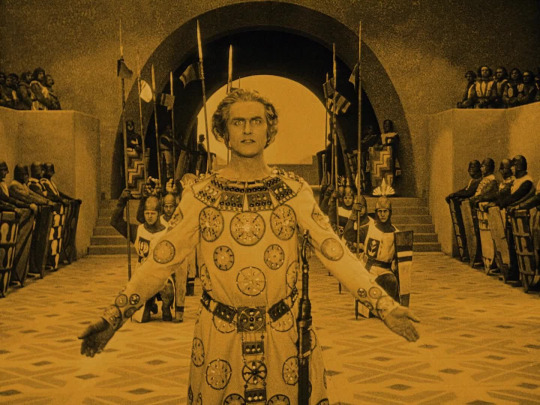
I did NOT expect to love these movies as much as I did. That they would be dazzlingly gorgeous I never doubted: the medieval world of the story is brought to vivid life through the geometrical mise en scene and detailed costuming. However, the plot itself is so, so riveting, never losing steam over the course of the four hours it takes to watch both movies. The first half is heroic fantasy; the second half involves a revenge plot of almost Shakespearean proportions. This might actually be my favorite silent Fritz Lang movie now.
Muppet Treasure Island (dir. Brian Henson, 1996)
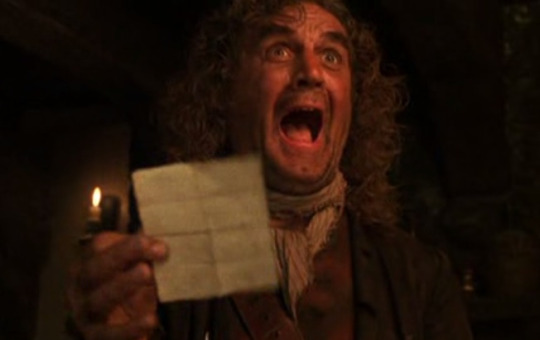
I understand that people have different tastes and all, but how does this movie have such a mixed reception? It’s absolutely hilarious. How could anybody get through the scene with “THA BLACK SPOT AGGHHHHHHH” and not declare this a masterpiece of comedy? And I risk being excommunicated from the Muppet fandom for saying it, but I like this one more than The Great Muppet Caper. It’s probably now my second favorite Muppet movie.
Belle de Jour (dir. Luis Bunuel, 1967)

I confess I’m not terribly fond of “but was it real???” movies. They tend to feel gimmicky more often than not. Belle de Jour is an exception. This is about more than a repressed housewife getting her kicks working as a daytime prostitute. The film delves into victim blaming, trauma, class, and identity-- sure, this sounds academic and dry when I put it that way, but what I’m trying to say is that these are very complicated characters and the blurring of fantasy and reality becomes thought-provoking rather than trite due to that complexity.
Secondhand Lions (dir. Tim McCanlies, 2003)
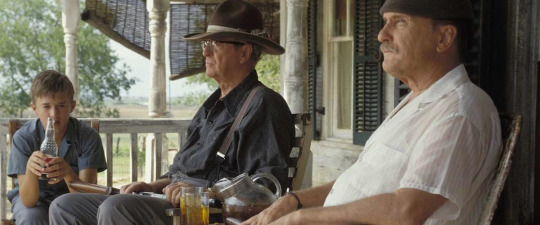
The term “family movie” is often used as a synonym for “children’s movie.” However, there is an important distinction: children’s movies only appeal to kids, while family movies retain their appeal as one grows up. Secondhand Lions is perhaps a perfect family movie, with a great deal more nuance than one might expect regarding the need for storytelling and its purpose in creating meaning for one’s life. It’s also amazingly cast: Haley Joel Osment is excellent as the juvenile lead, and Michael Caine and Robert Duvall steal the show as Osment’s eccentric uncles.
The Pawnbroker (dir. Sidney Lumet, 1964)

Controversial in its day for depicting frontal nudity, The Pawnbroker shocks today for different reasons. As the top review of the film on IMDB says, we’re used to victims of great atrocities being presented as sympathetic, good people in fiction. Here, Rod Steiger’s Sol Nazerman subverts such a trope: his suffering at the hands of the Nazis has made him a hard, closed-off person, dismissive of his second wife (herself also a survivor of the Holocaust), cold to his friendly assistant, and bitter towards himself. The movie follows Nazerman’s postwar life, vividly presenting his inner pain in a way that is almost too much to bear. Gotta say, Steiger gives one of the best performances I have ever seen in a movie here: he’s so three-dimensional and complex. The emotions on his face are registered with Falconetti-level brilliance.
The Apartment (dir. Billy Wilder, 1960)
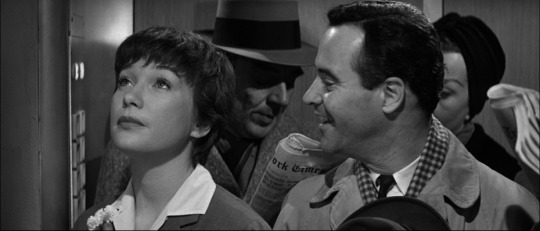
While not the most depressing Christmas movie ever, The Apartment certainly puts a good injection of cynicism into the season. I have rarely seen a movie so adept at blending comedy, romance, and satire without feeling tone-deaf. There are a lot of things to praise about The Apartment, but I want to give a special shoutout to the dialogue. “Witty” dialogue that sounds natural is hard to come by-- so often, it just feels smart-assy and strained. Not here.
Anatomy of a Murder (dir. Otto Preminger, 1959)
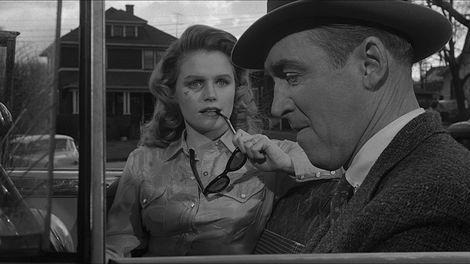
I’m not big into courtroom dramas, but Anatomy of a Murder is a big exception. Its morally ambiguous characters elevate it from being a mere “whodunit” (or I guess in the case of this movie, “whydunit”), because if there’s something you’re not going to get with this movie, it’s a clear answer as to what happened on the night of the crime. Jimmy Stewart gives one of his least characteristic performances as the cynical lawyer, and is absolutely brilliant.
Oldboy (dir. Park Chan-Wook, 2003)

Oldboy reminded me a great deal of John Webster’s 17th century tragedy The Duchess of Malfi. Both are gruesome, frightening, and heartbreaking works of art, straddling the line between sensationalism and intelligence, proving the two are not mutually exclusive. It’s both entertaining and difficult to watch. The thought of revisiting it terrifies me but I feel there is so much more to appreciate about the sheer craft on display.
Family Plot (dir. Alfred Hitchcock, 1976)
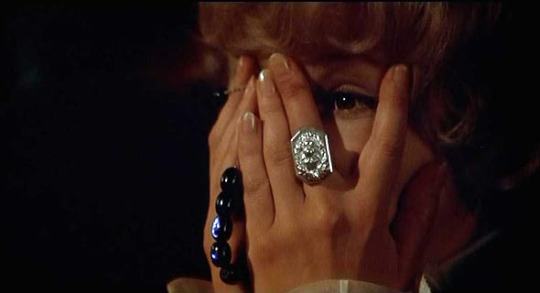
Family Plot is an enjoyable comedy; you guys are just mean. I know in an ideal world, Hitchcock’s swan song would be a great thriller masterpiece in the vein of Vertigo or Psycho. Family Plot is instead a silly send-up of Hitchcock’s favorite tropes, lampooning everything from the dangerous blonde archetype (with not one but two characters) to complicated MacGuffin plots. You’ll probably demand my film buff card be revoked for my opinion, but to hell with it-- this is my favorite of Hitchcock’s post-Psycho movies.
My Best Girl (dir. Sam Taylor, 1927)
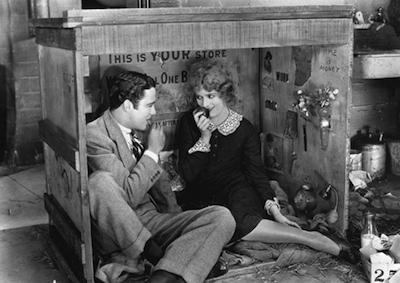
Mary Pickford’s farewell to silent film also happens to be among her best movies. It’s a simple, charming romantic comedy starring her future husband, Charles “Buddy” Rogers. Pickford also gets to play an adult character here, rather than the little girl parts her public demanded she essay even well into her thirties. She and Rogers are sweet together without being diabetes-inducing, and the comedy is often laugh out loud funny. It even mocks a few tropes that anyone who watches enough old movies will recognize and probably dislike-- such as “break his heart to save him!!” (my personal most loathed 1920s/1930s trope).
Parasite (dir. Bong Joon-ho, 2019)
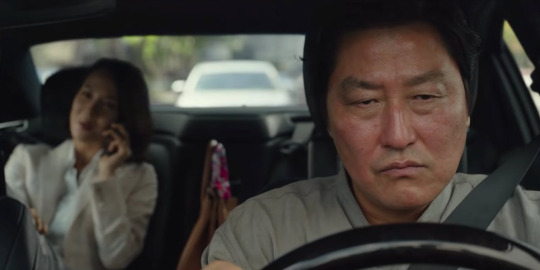
This feels like such a zeitgeist movie. It’s about the gap between the rich and the poor, it’s ironic, it’s depressing, it’s unpredictable as hell. I don’t like terms like “modern classic,” because by its very definition, a classic can only be deemed as such after a long passage of time, but I have a good feeling Parasite will be considered one of the definitive films of the 2010s in the years to come.
Indiscreet (dir. Stanley Donen, 1958)
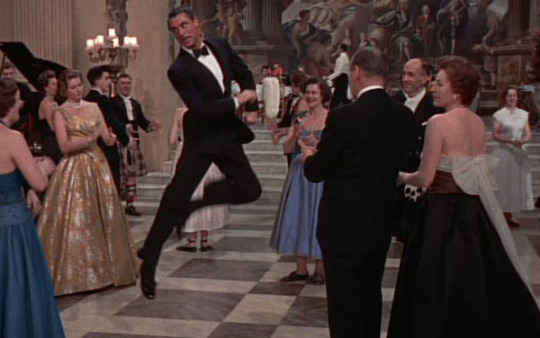
Indiscreet often gets criticized for not being Notorious more or less, which is a shame. It’s not SUPPOSED to be-- it’s cinematic souffle and both Ingrid Bergman and Cary Grant elevate that light material with their perfect chemistry and comedic timing. It’s also refreshing to see a rom-com with characters over 40 as the leads-- and the movie does not try to make them seem younger or less mature, making the zany moments all the more hilarious. It’s worth seeing for Cary Grant’s jig (picture above) alone.
The Taking of Pelham One Two Three (dir. Joseph Sargent, 1974)
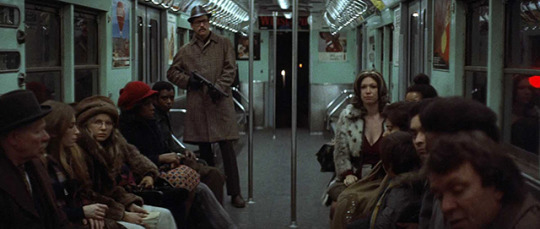
This movie embodies so much of what I love about 70s cinema: it’s gritty, irreverent, and hard-hitting. It’s both hilarious and suspenseful-- I was tense all throughout the run time. I heard there was a remake and it just seems... so, so pointless when you already have this gem perfect as it is.
They All Laughed (dir. Peter Bogdonavich, 1981)
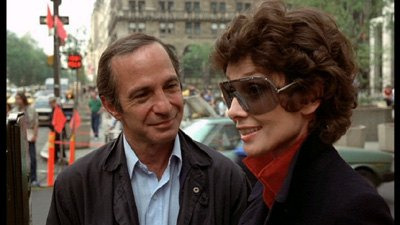
Bogdonavich’s lesser known homage to 1930s screwball comedy is also a weirdly autumnal movie. Among the last gasps of the New Hollywood movement, it is also marks the final time Audrey Hepburn would star in a theatrical release. The gentle comedy, excellent ensemble cast (John Ritter is the standout), and the mature but short-lived romance between Hepburn and Ben Gazarra’s characters make this a memorably bittersweet gem.
The Palm Beach Story (dir. Preston Sturges, 1942)

Absolutely hilarious. I was watching this with my parents in the room. My mom tends to like old movies while my dad doesn’t, but both of them were laughing aloud at this one. Not much else to say about it, other than I love Joel McCrea the more movies I see him in-- though it’s weird seeing him in comedies since I’m so used to him as a back-breaking man on the edge in The Most Dangerous Game!
Nothing Sacred (dir. William Wellman, 1937)
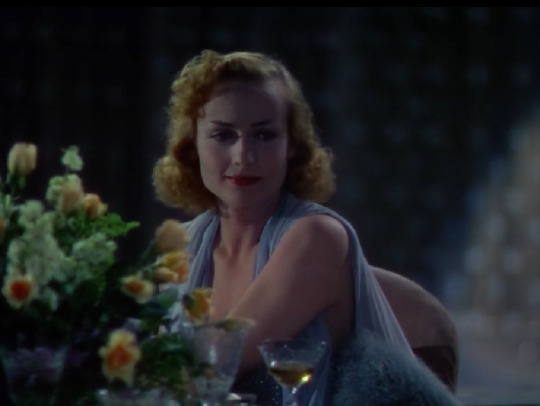
I tend to associate William Wellman with the pre-code era, so I’ve tried delving more into his post-code work. Nothing Sacred is easily my favorite of those films thus far, mainly for Carole Lombard but also because the story still feels pretty fresh due to the jabs it takes at celebrity worship and moral hypocrisy. For a satire, it’s still very warm towards its characters, even when they’re misbehaving or deluding themselves, so it’s oddly a feel-good film too.
Applause (dir. Rouben Mamoulian, 1929)

I love watching early sound movies, but my inner history nerd tends to enjoy them more than the part of me that, well, craves good, well-made movies. Most early sound films are pure awkward, but there’s always an exception and Applause is one of them. While the plot’s backstage melodrama is nothing special, the way the story is told is super sophisticated and expressive for this period of cinema history, and Helen Morgan makes the figure of the discarded burlesque queen seem truly human and tragic rather than merely sentimental.
Topaz (dir. Alfred Hitchcock, 1969)
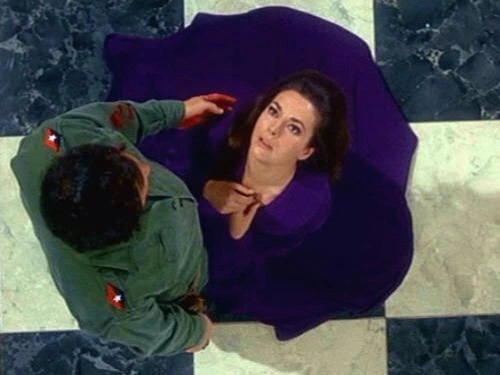
Another late Hitchcock everyone but me seems to hate. After suffering through Torn Curtain, I expected Hitchcock’s other cold war thriller was going to be dull as dishwater, but instead I found an understated espionage movie standing in stark contrast to the more popular spy movies of the period. It’ll never be top Hitchcock, of course-- still it was stylish and enjoyable, with some truly haunting moments. I think it deserves more appreciation than it’s been given.
What were your favorite cinematic discoveries in 2020?
#thoughts#belle de jour#topaz#family plot#the taking of pelham 123#the pawnbroker#nothing sacred#my best girl#applause#muppet treasure island#perfect blue#die niebelungen#parasite#the good the bad and the ugly#the palm beach story#they all laughed#indiscreet#oldboy#anatomy of a murder#the apartment#secondhand lions
156 notes
·
View notes
Note
hi hello!!! a lot of ur posts have some up on my dash and i rlly like ur analysis of c!dream. im a strong believer in the “Dream Is Aware That This Is A Game” theory and was wondering if u had thoughts on it? idk as a theory it seems to line up with a lot of ur thoughts on why c!dream acts and thinks the way he does
hi!! this is actually one of my favourite theories, because i adore characters who are aware of the fact they’re fictional/not real (hence my adoration for the writer dream au where he’s writing the script as a character,, GOD it’s so good sjfksdbk) ,, so here are some of my thoughts on it !!
the most common theory i’ve seen on this revolves around the book schlatt gave him being a script of the smp, which is a concept i adore so much, because it would certainly explain three things: a) schlatt’s character, b) dream’s change, and c) dream’s power.
in terms of schlatt, the guy was incredibly clever and was always one step ahead of pogtopia. whether it was replanting the tnt or killing their spy or dying while knowing manberg would soon follow him, schlatt was a guy who knew what he was doing. and the thing was that ,, schlatt didn’t SEEM like a clever character, you know?? he was comic relief up until the elections - and then shit hit the fan. it’s easy to see how he could have been “reading ahead in the script” as it were. comprehending you’re in a game/script is also probably ,, incredibly difficult, and could be a partial explanation behind schlatt’s alcoholism and general attitude ??
dream, too, deteriorates QUICKLY after he gets this book - whether it’s knowledge of the fact he’s in a game, the dream smp script, or just the revive book, it’s no wonder why. any of that kind of information instantly changes EVERYTHING in your life - for dream, it’s no different, especially if he becomes aware he’s in a game, because then nothing he does matters, does it?? he can kill whoever he wants or die or be evil and none of it matters - he’ll always come back and nothing has consequences because it’s all just a game.
the only thing that matters to him is keeping the game going. to continue the story, because otherwise he’ll die for GOOD, which ,, is a terrifying concept. so he takes on the role of the villain, plays the part to keep his and tommy’s story going, because hey, people might hate him, but he’s keeping them alive, in a way, he’s keeping the game interesting. he destroys everything he’d BEEN to keep himself and everyone he cares about alive ,, and it also explains how he can cut off attachments (not that i think he actually ever manages it, but for the sake of this thread let’s say he does!) !! because if nothing in his world is real, then nothing other than the things keeping the game going - tommy, himself and the disks - matter.
it explains how he’s always one step ahead, it explains how he’s got so many resources, it explains his huge build of the underground finale cliffside box ,, he can cheat the game, he can see what’s coming next or just spawn in more items for himself. in a way it’s like creative mode, in a way, because once he’s learned he’s living in a game, he can learn the mechanics.
god this is SUCH an interesting theory and i could talk forever about it, but i’ll refrain :’)) thank you so much for this ask though, this was POG to answer and i hope it was interesting for ya!! :]
#> my asks !!#-> my analysis !!#-> my theories !!#tw alcohol#tw alcoholism#tw alcohol abuse#tw manipulation#tw mental illness#tw trauma#tw self destructive behavior#tw death#tw murder
63 notes
·
View notes
Text
MY TOUGHTS ON PART TWO OF RED HOOD BY CHIP ZDARSKY :)
A DC BOOK THAT TASTES LIKE MARVEL.
You know when you are reading a book and you feel like the story you are reading seems familiar but not really within the context you are reading it at the moment? If you can’t shake the wrong sense of familiarity you search for what it probably the biggest give away, the author.
Here it’s something like that; I have read other pieces of Chip Zdarsky’s work, namely Daredevil. While I could tell you the familiarity is there, in the subject of guilt after taking the life of another person, the reality is that this book doesn’t taste like Daredevil, it tastes like Marvel.
That can be either an excellent thing (because Marvel has amazing books) or something terrible (because DC isn’t Marvel and they don’t work the same way).
As of now I can’t really tell if this Red Hood story is going to be one or the other, but I can tell you that it feels out of place in the DC universe, or at least that’s how I see it. I will explore this particular thought later, I just thought this was a nice way to open this post.
If you would like to read the first post I made about this book I will leave the link here!
Now…let’s begin.
Part two picks up exactly where part one left off, we see Jason calling Oracle so she can bring the police to the place where Jason killed Andy a.ka. that gigantic piece of shit.
Jason is having some thoughts, ones that I think are important.
“I have taken lives before, a lot of them. I have killed guys knowing nothing about them except that they had guns and murder in their hearts. Those ones are easy; I don’t have to think of their mothers getting the news or of kids being...”
Jason is troubled. He is now in front of a reality that he never truly thought about but to be honest with you I strongly believe that nobody in the DC universe thinks beyond what happens in front of them, that’s just how fictional comic worlds are designed.
Anyway, there is a little something that bothers me in this inner monologue of his, like since when have “murderers” been Jason’s actual target? Like Joker was his target but he didn’t kill him, the base of Jason’s morals when it comes to killing has always been drugs, most importantly if you sell drugs to kids. So unless he is saying “murderers” because they were selling drugs that caused people (especially kids) to overdose then I don’t really get what is going on.
Another thing that I also talked about in the first post is that Jason hasn’t killed in a very long time, this man has been sticking to the Bats rule for so long that it’s actually unreal. Even when he shot the penguin and Batman proceeded to almost beat Jason to death the penguin hadn’t died. So once again I am thinking that Zdarsky has some info that he is not sharing right now or maybe he just didn’t read Lobdell's run (in which case, can you really blame him?)
Now let me talk about the other part of his monologue “…I don’t have to think of their mothers getting the news or of kids being...” This is something that I haven’t seen in DC, direct consequences after a hero/vigilante does something, and let me tell you it feels out of place. Is it a good or bad thing? I don’t really know but I have some thoughts on the subject.
I think it's unfair to put a comic character in that situation or dilemma. Jason has basically three reactions to the same situation and they are all valid, but can this situation be handled by a fictional person in a fictional world? Because to be fair I could also ask about the criminals that are put in hospitals after they are beat up by heroes, what if they die in the hospital? Is the hero a killer or does it fall on the hospital? If a criminal cannot pay for the attention given to them in hospitals and they immediately go back to criminal activity to pay for those things, are heroes a good thing? If the Joker bombs a hospital for the third time in four months and Batman does the same thing (take joker to Arkham) only for Joker to escape and do it again, is Batman as guilty as the Joker for the deaths of innocent people or not?
As I wrote it and as I read it again I see that it is a crazy thought because you can simply add more depth to the characters decisions and the consequences that would ensue because of them, but Gotham is a fictional city created to establish that crime is off the charts and that they need Batman because no amount of resources will be able to fix this city’s problems. So putting Jason in this position is new to me…but only in DC (more of this particular thought below).
Going back to the comic in question, I feel like Jason had the answers and the ideas all in his head. In this issue alone he basically says that if the mother does not pull through the boy will be alone, but alone means going into the system (a horrible system that Jason does not trust and needs improvement), but also, Jason recognizes that if the mother died and the father was left alive then that man would have done horrendous stuff. I just simply wouldn't believe that a man that gave drugs to both his wife and son so they wouldn't bother him is just going to change after realizing that his wife died because of him. Even less believable is him becoming an amazing father.
In the big scheme of things, Jason has killed people who fitted very certain characteristics, never innocents (bye, Morrison). What happens after the killing is done? We don’t know because past stories have never focused on that (criminals in comics are by default one dimensional, villains are not)
But here is the thing, Zdarsky is a Marvel writer and Marvel has gone in depth within those situations (like what happens after heroes commit mistakes or kill someone) mostly with Civil War by Mark Millar and more recently in Daredevil written by Chip Zdarsky, but DC hasn't and DC has been plain for a long time, DC doesn't really explain how batman hurts people severely and nothing happens beyond that.
What I am trying to say is that Zdarsky is going for a different and unique route for Jason here but I think the story is out of place in the DC universe.
I promise I am done with those thoughts, they were really difficult to put on paper and to make them make sense, so I apologize if I only confused you, sorry!
Anyway! After the monologue is done we have a flashback where little Jason is being told by his mother to go buy bread (the only thing they can afford) but she is also making him leave so he doesn’t have to be present when Robby (a friend if you ask Jason’s mom, a drug dealer if you ask Jason) comes to the apartment to help her.
Sadly as Jason is leaving Robby is walking up the stairs, now not to copy little Jason but fuck Robby. Jason’s issues with drugs, drug dealing and overdosing is once again shown here but what is also shown is the violence that comes with it. Jason being terrified for himself (and his mother) as Robby pulls a knife on him broke my heart and as he is left there in the corridor to his apartment all we can see is a defeated little boy and that shit hurts a lot.
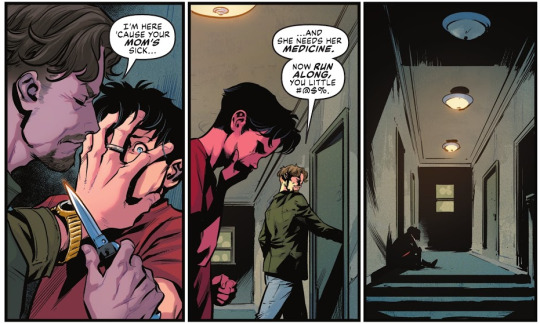
After that we jump back to the future with none other than Batgod…I mean Batman. Batman is following a man called Sydney and apparently he disappointed Batman because B told him to stop being a criminal, like come on man if I ask nicely or if I break both of your arms you will surely stop, right? Yeah, no.

I feel like I mentioned something about this while my brain decided that DC never usually explains what happens with criminals after they get caught or killed and now here we are. Consequences. Batman scares a man off of working for Scarecrow but the man still needs to work (does he have a family to provide for? We don’t know. Does he do it because it’s the only job he can get? We don’t know.)
This Batman intermission ends up with Oracle telling him that Jason might be in trouble.
So we find ourselves back with Jason and Tyler in his safe house, Zdarsky does not hesitate and first thing he does is give us a couple of very angsty panels.
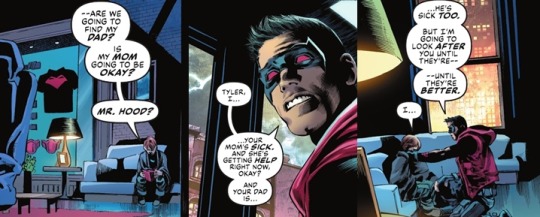
I love the way it hurts.
Jason honey, my sweet chonky boy…what are you doing?
Well at least I am not the only one asking that because Jason is having a moment to reflect about what has happened, what is happening and what could happen in the future. In this monologue he says the following:
“Dammit, Jason, what the hell are you doing? You can’t take care of this kid! But you can’t put him in the system either! Just waiting for some obsessed militaristic billionaire to adopt him? Dammit. His dad was scum, he hurt Tyler, he hurt his mom. But if Tyler’s mom doesn’t pull through…I just made this kid an orphan. He is my responsibility, he is too young to really see what he’s gone through, he can still be saved…unlike…”
Yeah that’s some really angsty thoughts, he is really going through it and I understand it. He lost his cool after what that horrible human being said he did and killed him and now he has to face the consequences of his actions, he recognizes that if the boy is left truly alone he will have to step up…but here is the thing, does Jason really want that? It seems to me like Jason is deeply against the idea of children working as heroes, and here he is as an adult that is a vigilante with an impressionable child that sees the Red Hood as his hero, I don’t know, it looks like the perfect recipe for a disaster.
But we don’t get to see what Jason does right away because its flashback time.
Jason only moved from his spot in the corridor of his apartment door to get the bread but as Robby comes out of said door Jason is there waiting. Robby teases that he and Jason’s mom ended up sharing the “medicine” and that she will be sleeping for a long time, and that seems to be it for Jason because next thing you know Robby is falling down the stairs.
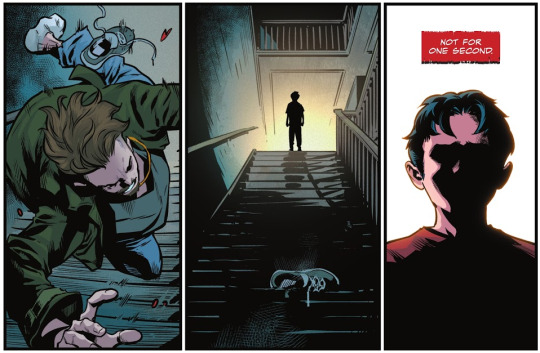
Aw, shit.
Jason from the future continues his monologue while he remembers what happened on those stairs.
“I never had a chance, not for one second. But he does, Tyler has a chance. I can help him, help him be okay. This doesn’t…what I did…what his parents did, it doesn’t have to define him.”
So Jason wants to make things right for Tyler so he doesn’t become like Jason. Now I don’t truly know what Zdarsky is going for but I will go for the unconscious route, little Jason pushed Robby (that fucker) down the stairs and he was left unconscious there.
In Jason’s eyes Tyler is still a good kid that deserves only the best (like you Jason, please don’t think so low about yourself) and that can be saved from a life of vengeance, justice and trauma. But whatever Jason was going to actually say to Tyler we don’t know because Tyler informs Jason that through the Red Hood mask there is someone telling him that Batman is coming.
Batman appears out of nowhere as he does and starts talking shit.
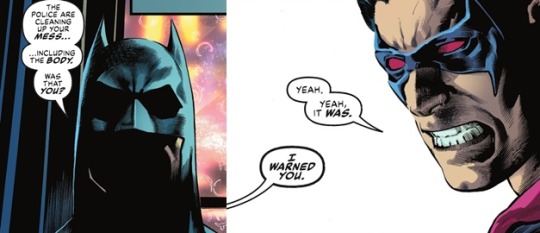

Honestly Batman what is with that “not my town” bullshit? Baby this isn’t the medieval times, you are not a king and as far as I know not only is Lucius Fox richer than you but so is Dick so sit your ass down and shut the fuck up.
Luckily Jason is giving the outstanding amount of zero fucks and tells Batman exactly what he needs to be told, sadly Jason’s big brain time doesn’t last long because he absolutely loses his cool and starts a fight. So you know what that means, monologue time!
“This was a mistake, but I can’t help myself, he gets under my skin. His sanctimony, he acts like he’s God, all knowing, all seeing when really…he’s just another failed parent.”
Amen. Jason knows many languages but he chose to speak facts.
As the monologue ends Batman is standing over Jason like he is about to murder him but no such thing happens because Tyler, who was quietly watching them fight, jumps in to protect Jason. Yep, there goes my heart, goodbye.

And this is it. The issue ends with Tyler putting an end to the fight and telling batman that he has to leave the Red Hood alone because he is a good guy. Jason of course is thankful and promises that everything is fine.
I don’t know about you guys but so far I can’t say if I like the book or not. Both parts left me with mixed feelings. I obviously want to see how it ends but I honestly think that there is only one way this story can end with a happy ending, which I think it would be Tyler going back to his mom and Jason somehow working to help her with her drug addiction, maybe even have Dick involved so he can help them economically.
Things that I surely do not want to see are Jason backing down again and limiting himself to the Bats rules. I also absolutely don’t want Zdarsky to go all Geoff Johns on us and make Jason think that he should give up the Red Hood mantle.
Jason really needs to gain his confidence back, he was smart, calculated and strategic and now they have taken those things away to accentuate his “daddy issues” and “inferiority complex”. Why the quotation marks you ask? Oh, because those things are bullshit and there is no room for those things in Jason’s characterization other than to add more angst to the plot.
Let me know how you felt about the issue and my review! Are you excited about what the four next issues are going to bring to the story?
Also if you read Marvel, did this issue taste like Marvel to you too or am I going crazy?
#Jason Todd#red hood#red hood outlaw#batman: urban legends#batman urban legends#infinite frontier#DC comics#robin
35 notes
·
View notes
Text
Semi-coherent Thoughts on the Poppy War Series
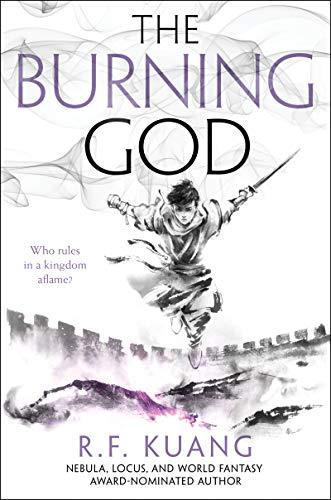
(Because I really need to start forcing myself to write semi-consistently again)
So I’ll say outright that I actually liked the series quite a bit, which does mean I actually got engaged and invested enough to start turning it over and picking it apart in my head after I finished it. So, like, this is probably going to come across as more negative overall than my actual opinions of the books.
Anyway, first off I really do adore Rin as a protagonist (I’d say ‘heroine’, but, well, no). Now partially this is because I always love even minimally sympathetic morally grey (..grey like coal soot, in this case) protagonists. But she’s just also such a complete garbage fire of a person, it’s kind of endearing. Well, that’s a bit callous – her entire personality is more or less a conflict between different kinds of unhealthy responses to powerlessness and trauma. Be she’s also just such a mess, and when she really starts leaning into delusions of grandeur you can’t help but root for her and hope things do actually turn out okay, regardless of how many fivers of blood she’s currently fantasizing about creating.
A big part of that is just how thoroughly awful the entire setting is, and how terrible everyone in it are, of course. Like, there are basically exactly three developed character in the entire trilogy who are unambiguously at least mostly good people (Chen, probably Venka, specifically the amnesiac and semi-delusional version of Jiang, but that’s being generous), and the fact that they stick around with Rin right to the end kind of puts that into doubt, honestly. Beyond that – almost every family has negligent or abusive parents, and literally every political figure is a bloody-handed tyrant ruling through violence and fear. The Hesperians are racist imperialists convinced they have a divine mandate to conquer the world, the Mugenese are every horror story from the IJA during WW2 translated to a pre-industrial fantasy setting, the ruling elite of Nikara are so many racist, scheming, power-hungry snakes with no concerns except their own position....
And, part and parcel with how terrible the setting is, Kuang does an incredible job of making all the worst things Rin does (until the final act, anyway) incredibly cathartic and badass and fun-in-a-fucked-up-way to read. There’s a terrible sort of awe while she turns the main islands of not!Japan into a pyroclastic hellscape. And whenever she gets a chance to enact any of her numerous revenges on some of the many people who abused and betrayed her it’s always poetic, in a Count-of-Monte-Cristo sort of way, and so kind of sickly compelling, even beyond it being some of the only times Rin’s really hopeful and happy. (Also, there are fun villainous monologues and quippy post-murder one-liners!)
Also, all forms of love are a terrible idea 100% of the time and is only going to end in at least one of the parties dead, abused, or (more or less literally) killing themselves in order to keep up with the other/earn their approval/try to keep them together. (I mean, Rin mostly had horrible taste in men, but Chen wasn’t able to stay mad at her for longer than a few months even after the whole ‘genocide’ thing, which he’s just about the only person to react to with any horror whatsoever. And look at how that ended up working out for him, so-)
I’m sure comparing grimdark fantasy to A Song of Ice And Fire is thoroughly out of fashion by now, but the overall perspective really did strike me as incredibly similar to Martin’s, a lot of the time. ‘Legitimate’ power and ‘lawful’ authority are ultimately nothing but polite fictions maintained by violence, terror and brutal oppression. War is a hell suffered most keenly by civilians with the misfortune to live and die in the middle of it, and least of all by the people with the power who actually start and end them. A flawed and unequal peace is very often preferable to dragging everything to hell with you as you die for the sake of freedom. And so on.
Now, to start the nitpicking – this is entirely personal and aesthetic, but it was kind of annoying how each of the first two books ended in moments of megalomaniac grandeur and terrifying empowerment, and then the next book started with a timeskip of things having gone to shit and her back under someone else’s thumb, and then a solid majority of the text is spent getting manipulated, betrayed, and finally crawling and clawing her way back out to the same point (both emotionally and in terms of independence/vision) that she had been at the previous book’s climax.
This isn’t anything even close to unique to TPW, of course – everything going to shit between the end of one story and the start of the sequel is kind of endemic to a lot of genres, really. And it is frankly incredibly in character for Rin to go through cycles flipping between resentment at being manipulated and used, and desperately craving authority figures to tell her what she should do and give her validation as valuable or useful. Still a bit annoying to read, though.
I’m sure it’s more me than the books – not like they didn’t put in the effort – but I could just never get really invested in the whole enemies-to-almost-lovers-to-enemies-again-to-? Thing with Nezha. Like, he’s interesting in that you can do a 180 perspective flip and he’d clearly be just as suitable a protagonist as Rin is, and his life’s very sad and everything. But, like, we get a front row seat to Rin’s internal monologue, and she gets thirsty for plenty of terrible men (and one awful woman), the only thing that makes Nezha special is that he’s not at least twice her age. So I never really got nearly as emotionally invested in them as the books seemed to expect me to. Which does kind of hurt the whole final act of book three.
Speaking of – okay, the ending isn’t awful or anything, but it is kind of disappointing in being exactly what you would expect it to be, as far as Rin’s character arc goes? Which might be just because I was already primed to compare this to ASOIF and she just literally pulls a Daenerys (fire-aligned vengeance/justice character with revolutionary impulses and an autocratic sensibility is willing to burn down the world in the process of freeing it, goes mad with power and paranoia, needs to be put down for the good of the country), but still. Her reading Venka throwing her to the ground to avoid an assassination attempt as a betrayal and burning her to death before she realized what was happening was just really heavy handed, you know? Same with turning on Kitay, who at this point is her actual literal soulmate. (Also sad in a broader sense, because those two are like literally two of the only characters in the entire series I’d actually peg as worthy of/capable of being trusted with political power.)
The specifics aside, I’m a miserable enough person to appreciate how unsatisfying the actual resolution at the end of the book is – imperialism wins! Literally no choice but to sign those unequal treaties and hope you’re eventually able to grow strong enough to force them out! Everything is the same as before this forty-year cycle of wars except much, much worse! - but yeah, I really just don’t actually care about Nezha enough as a character for it to really land. Also Kitay and Venka deserved better, even if literally no one else did.
Anyway, yeah, good series. Would recommend if you like the genre and can stomach all the, well, everything.
#books#the poppy war#the dragon republic#the burning god#r. f. kuang#book review#in this essay I will#this is theoretically a writing blog
44 notes
·
View notes